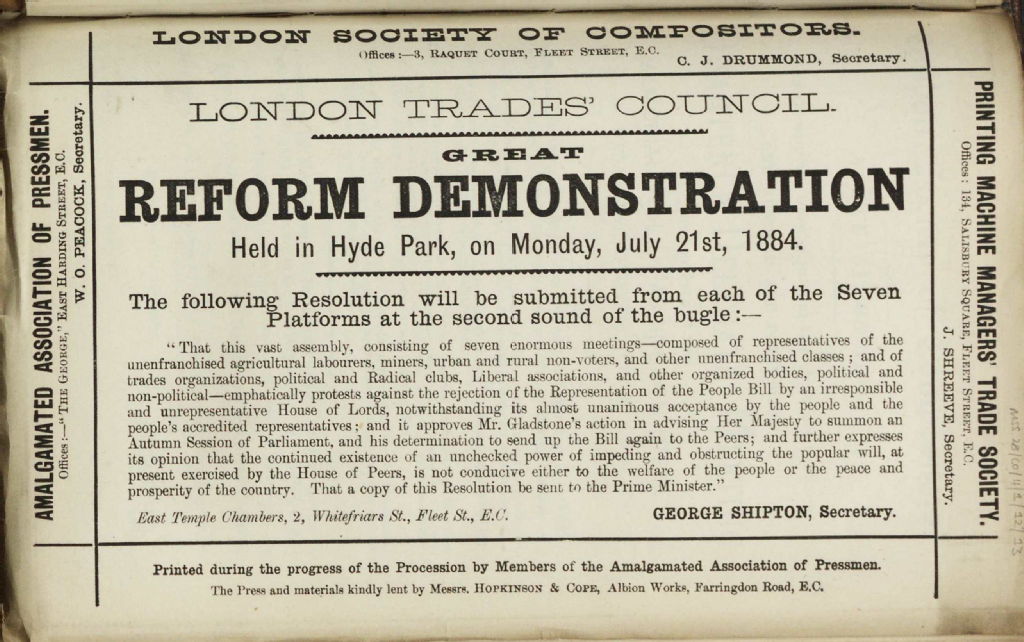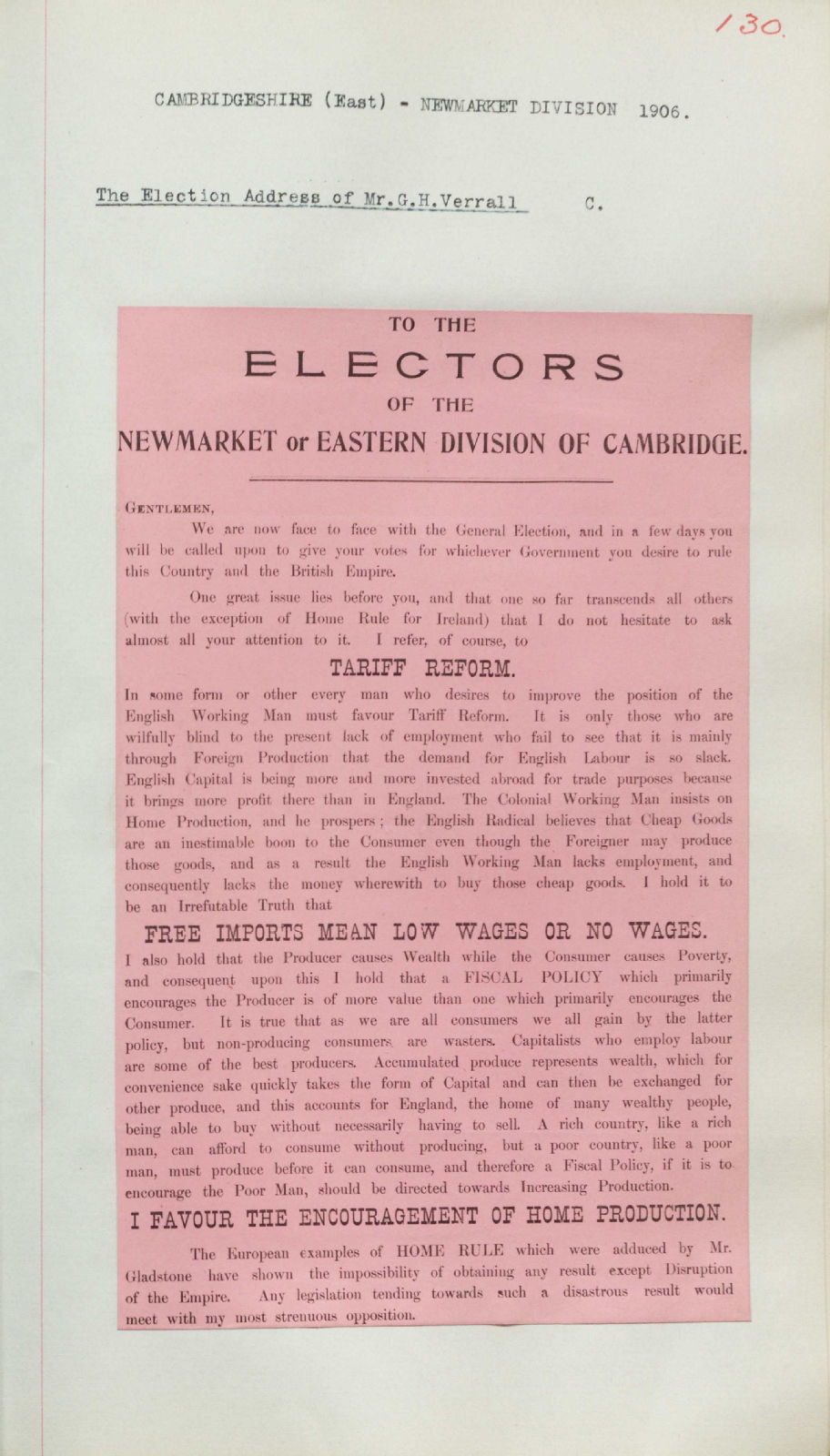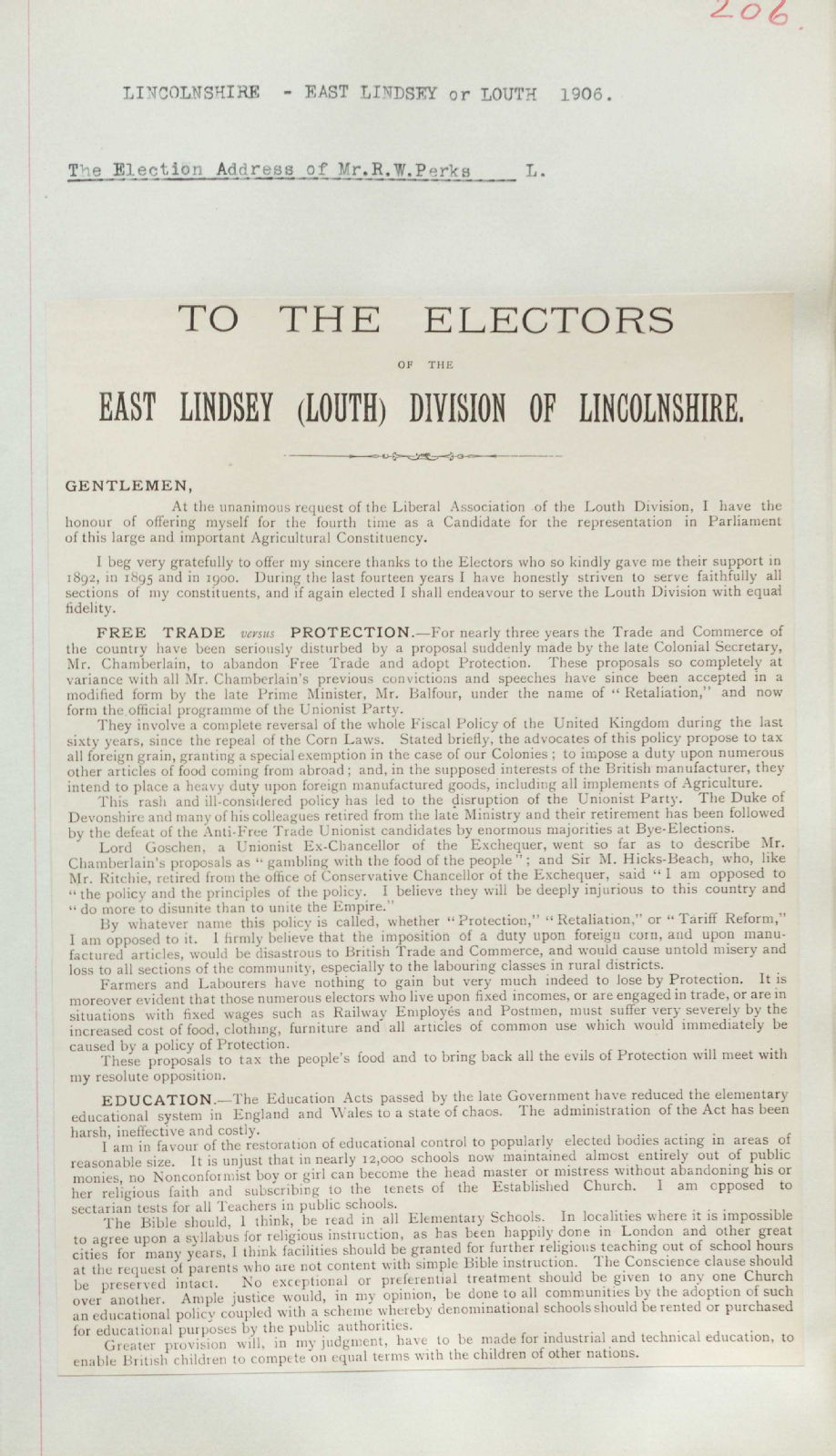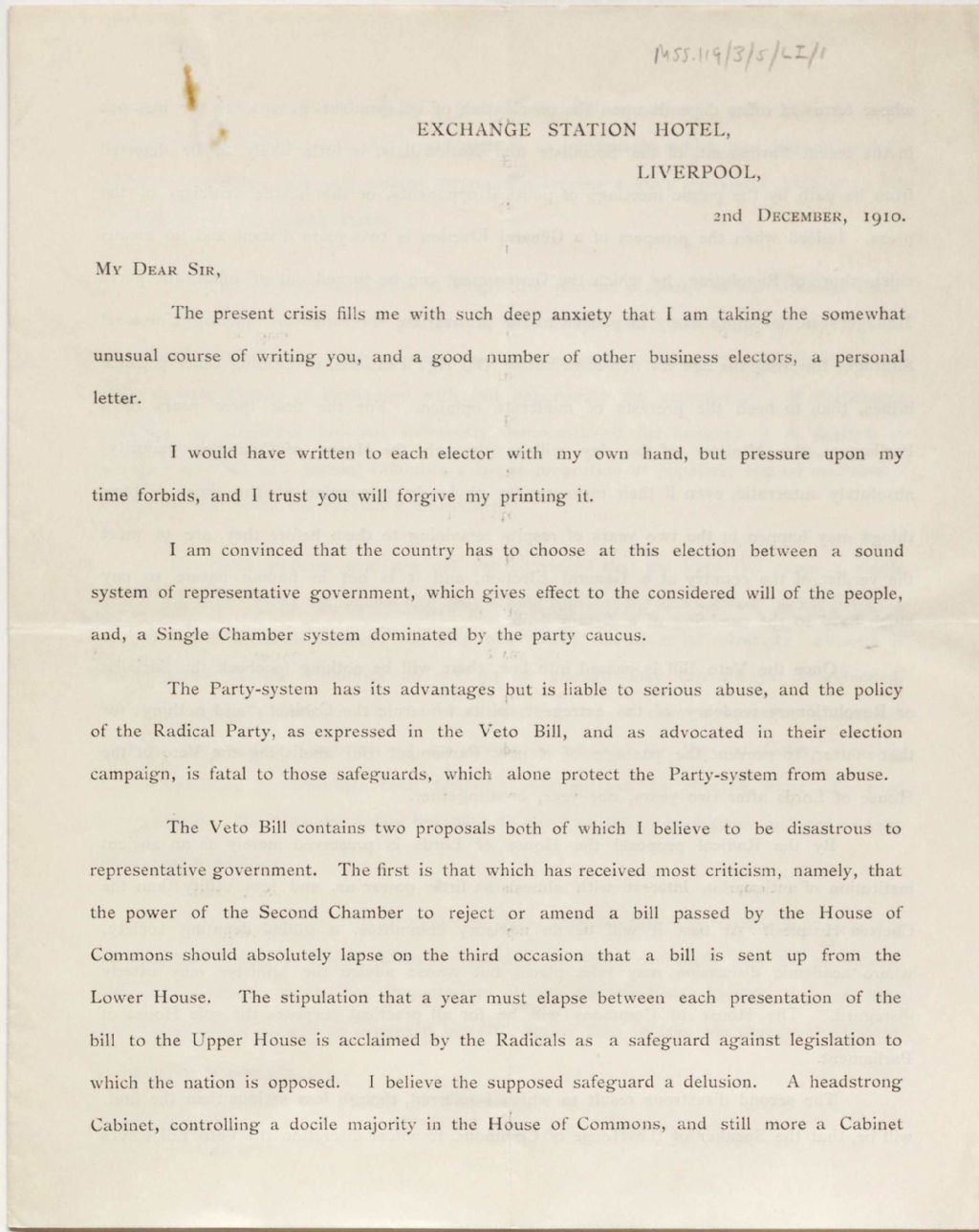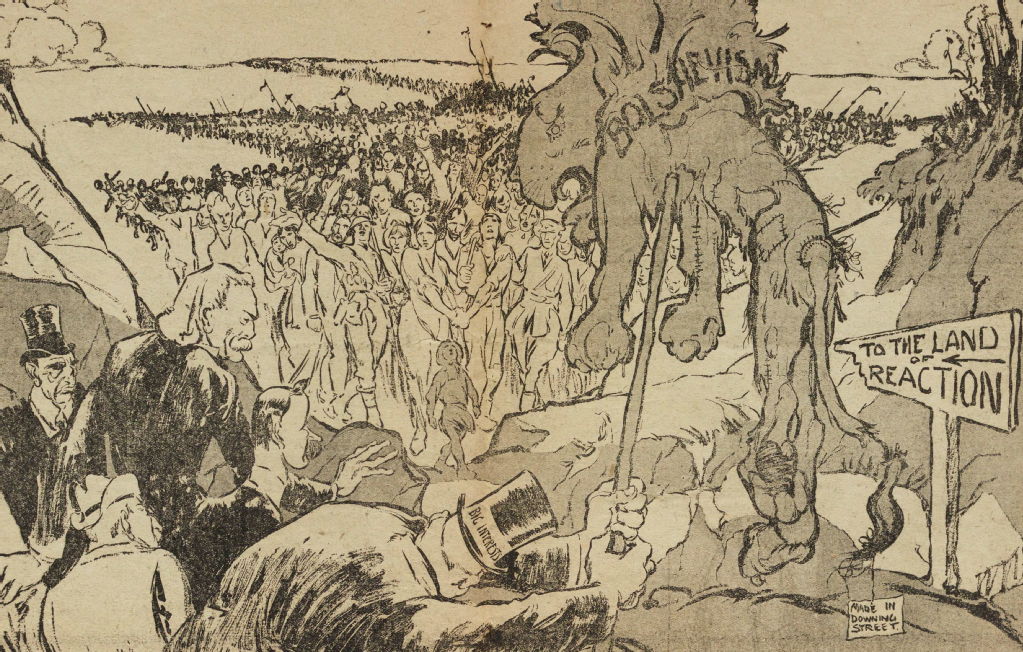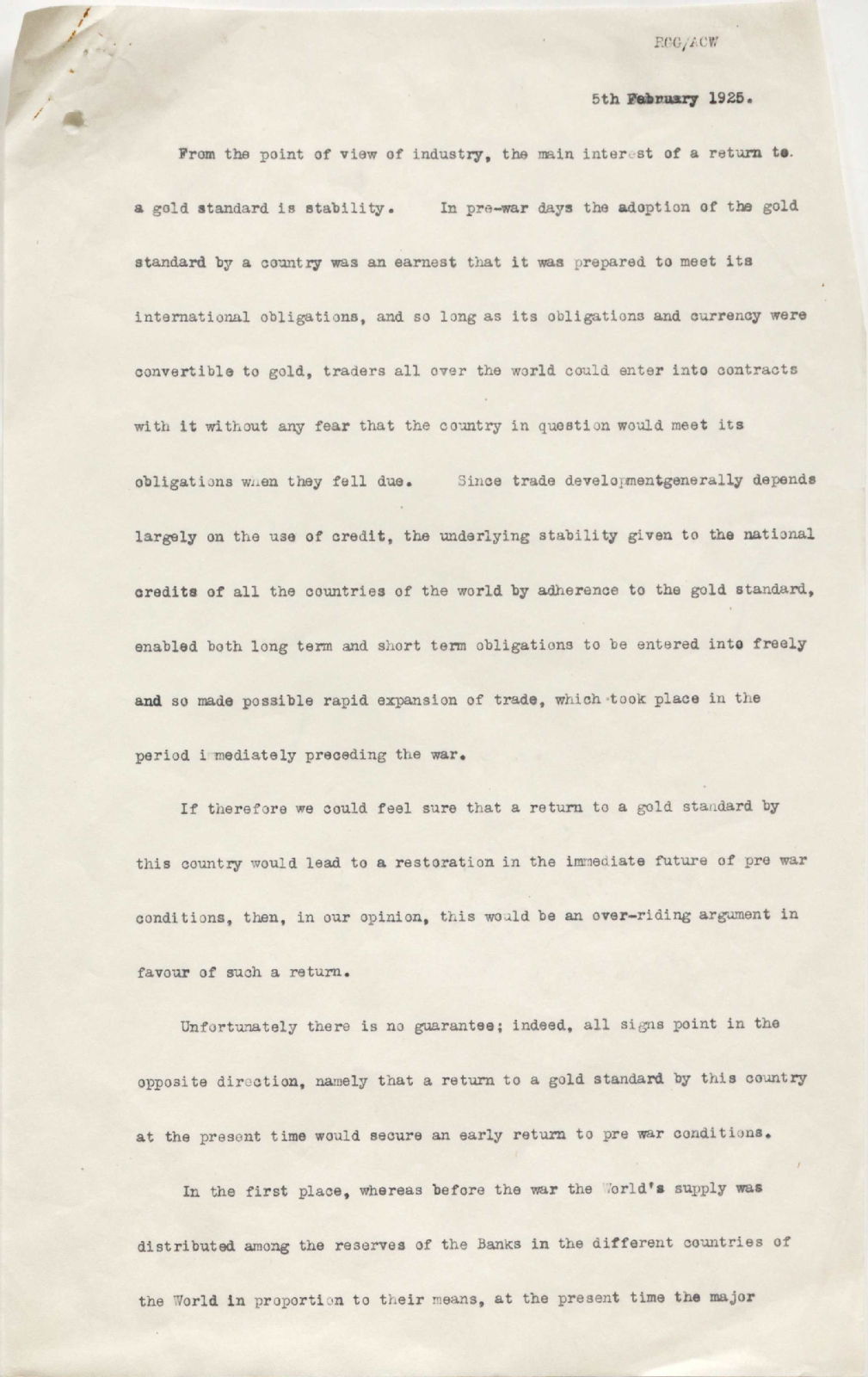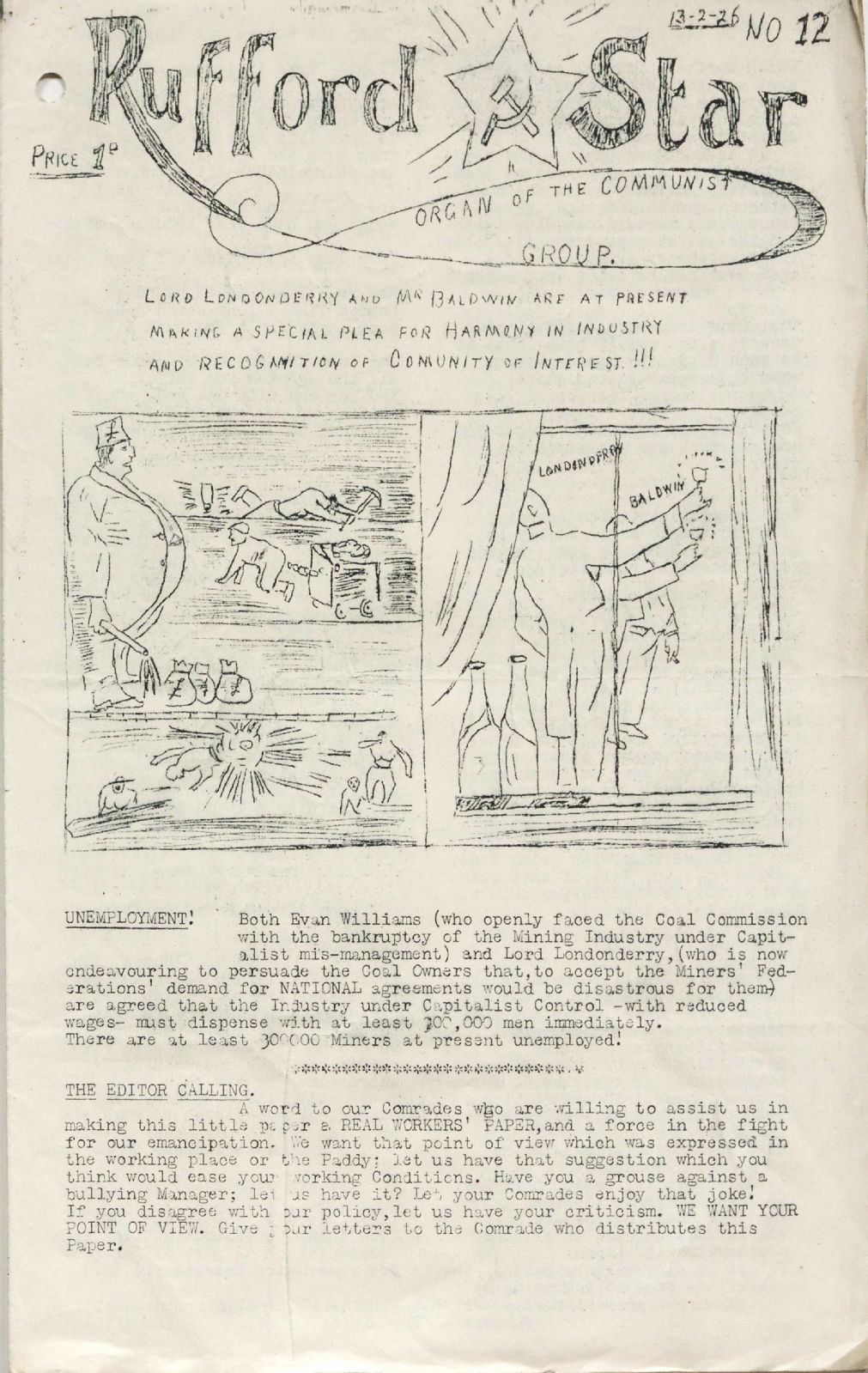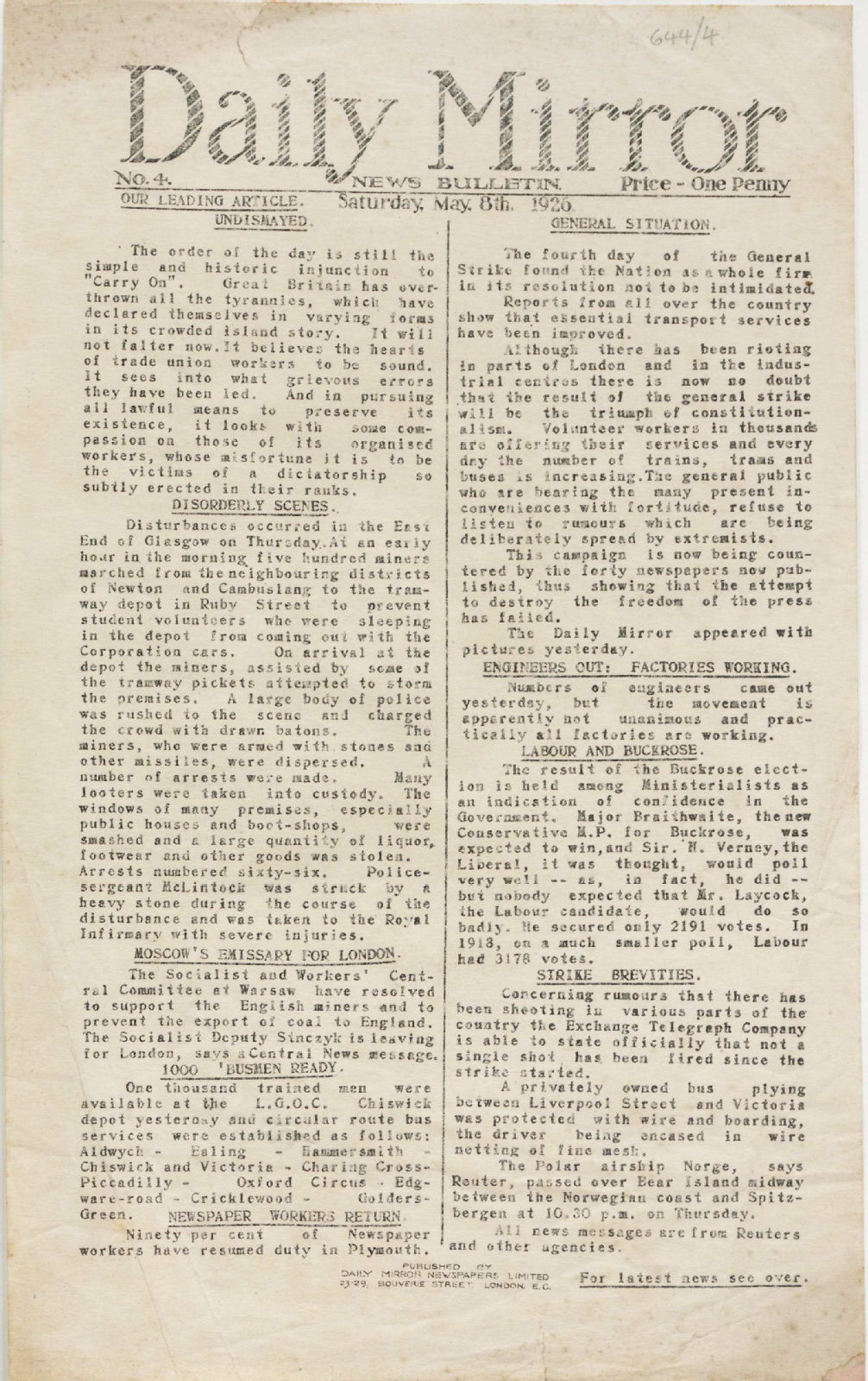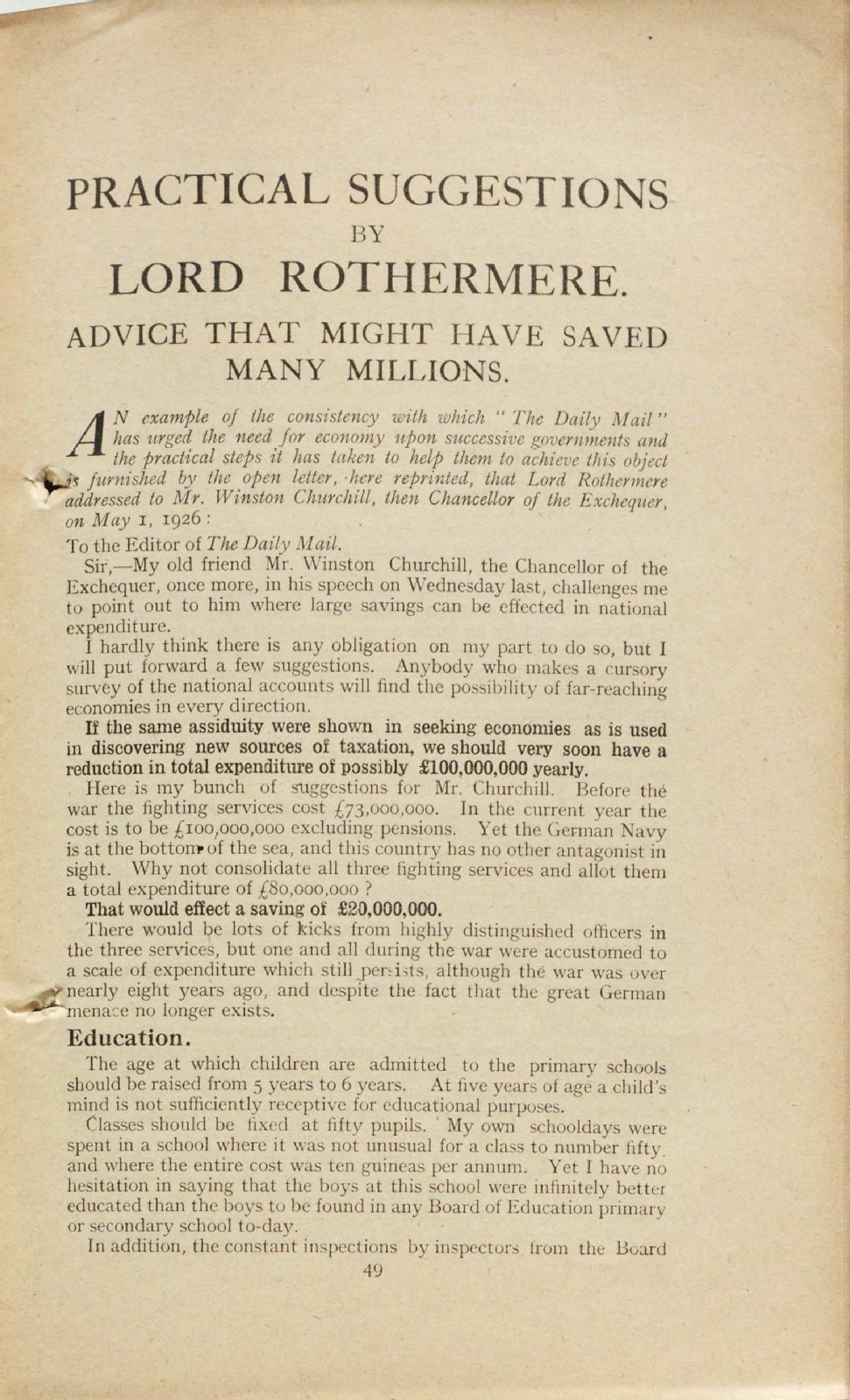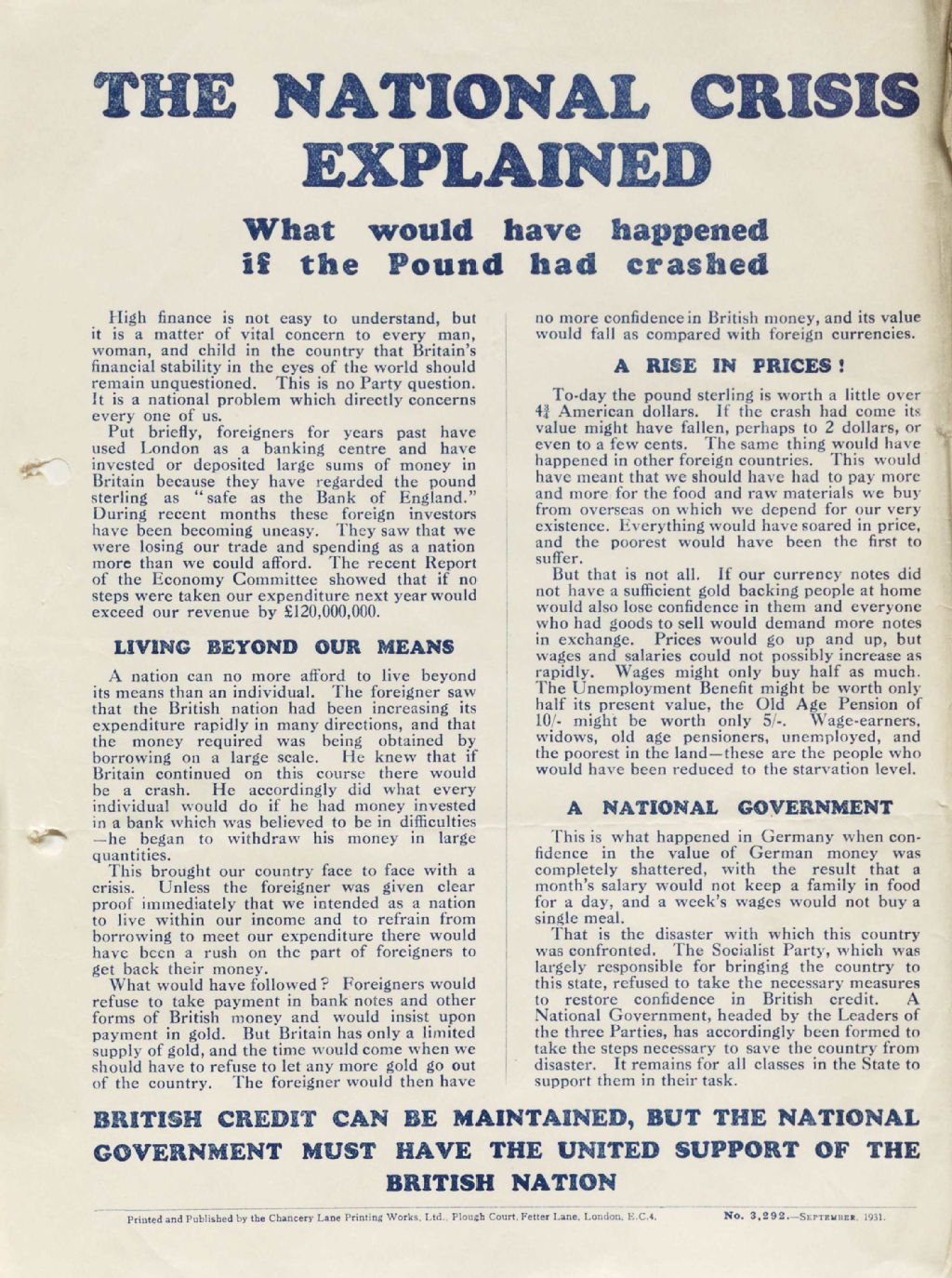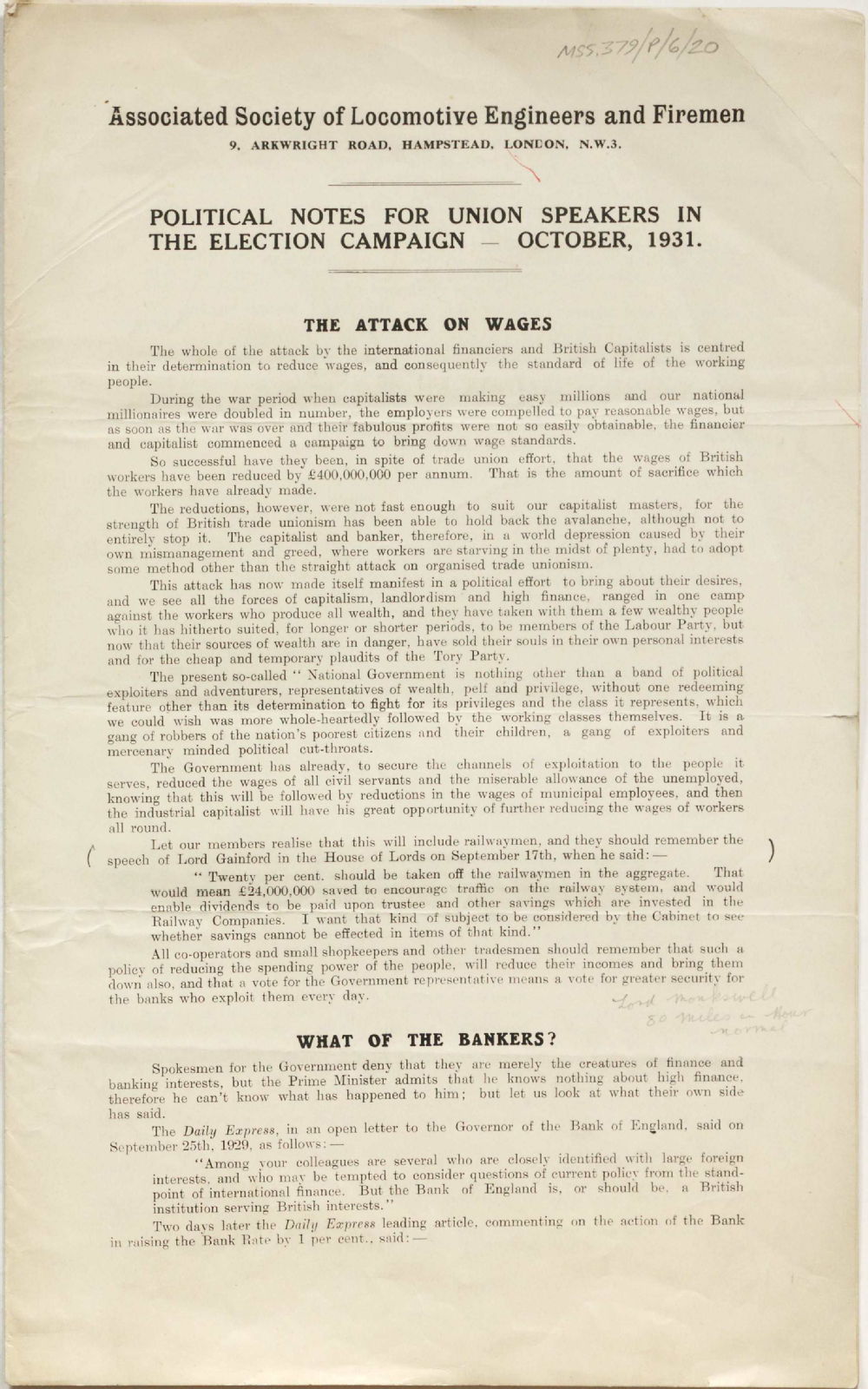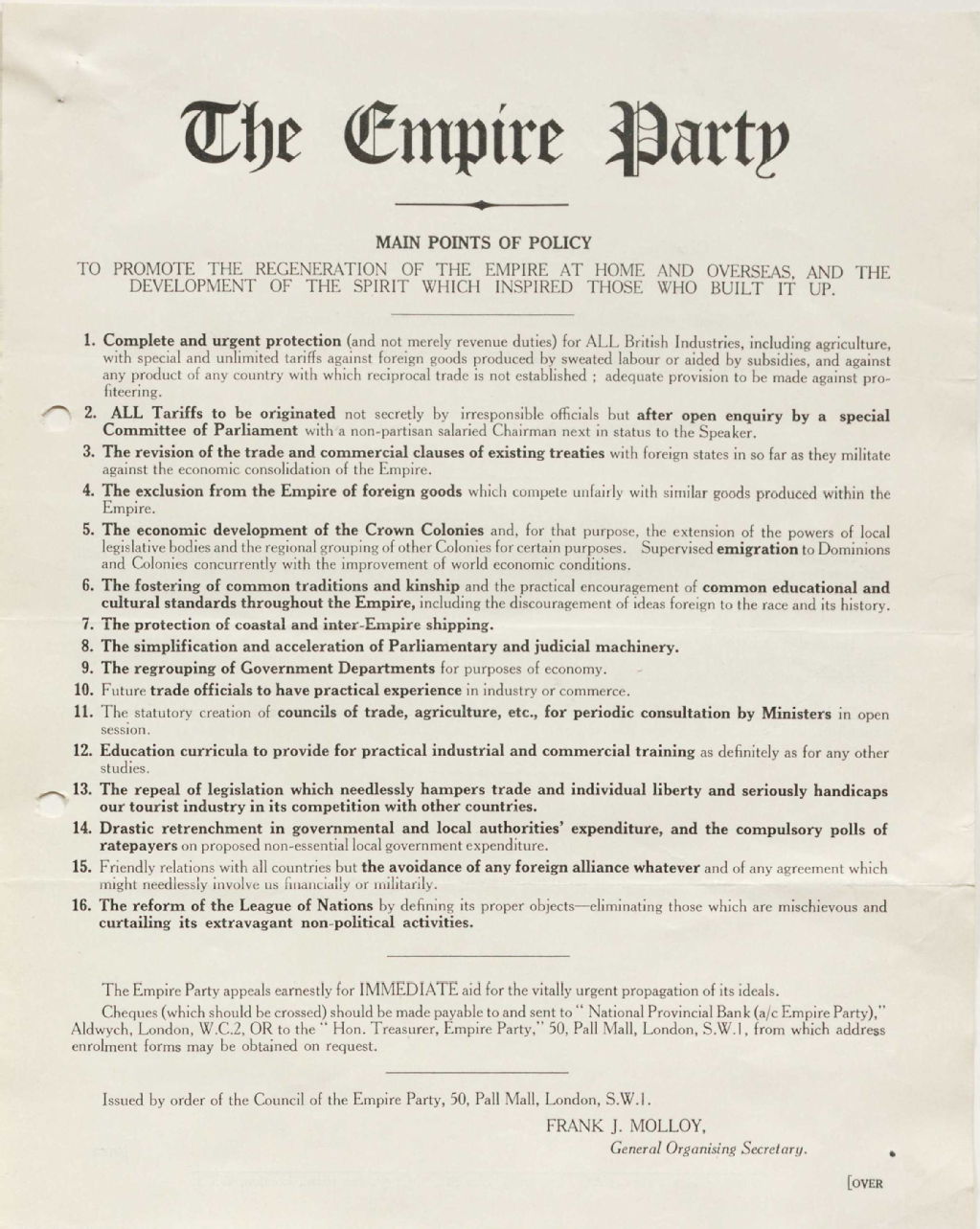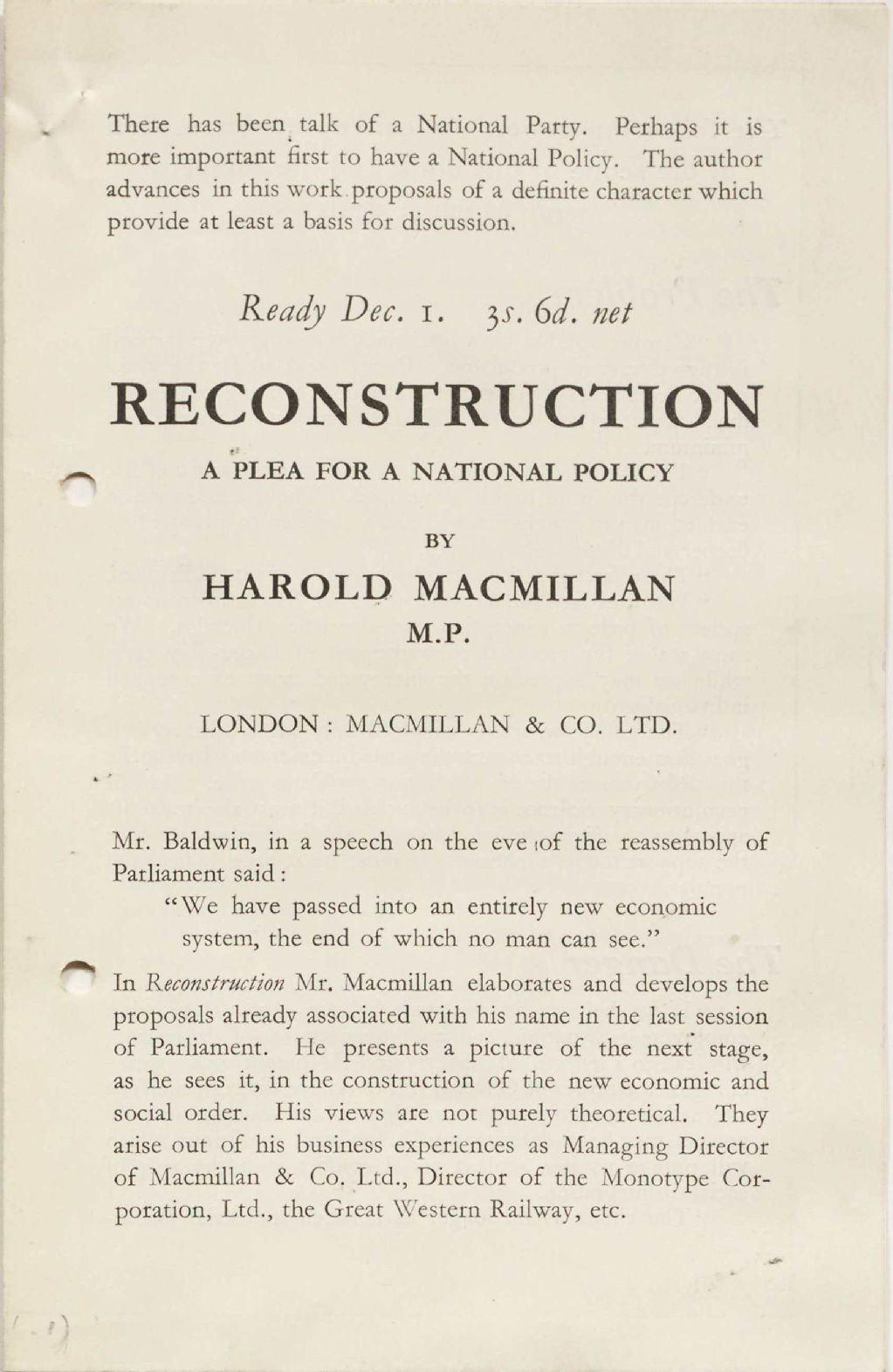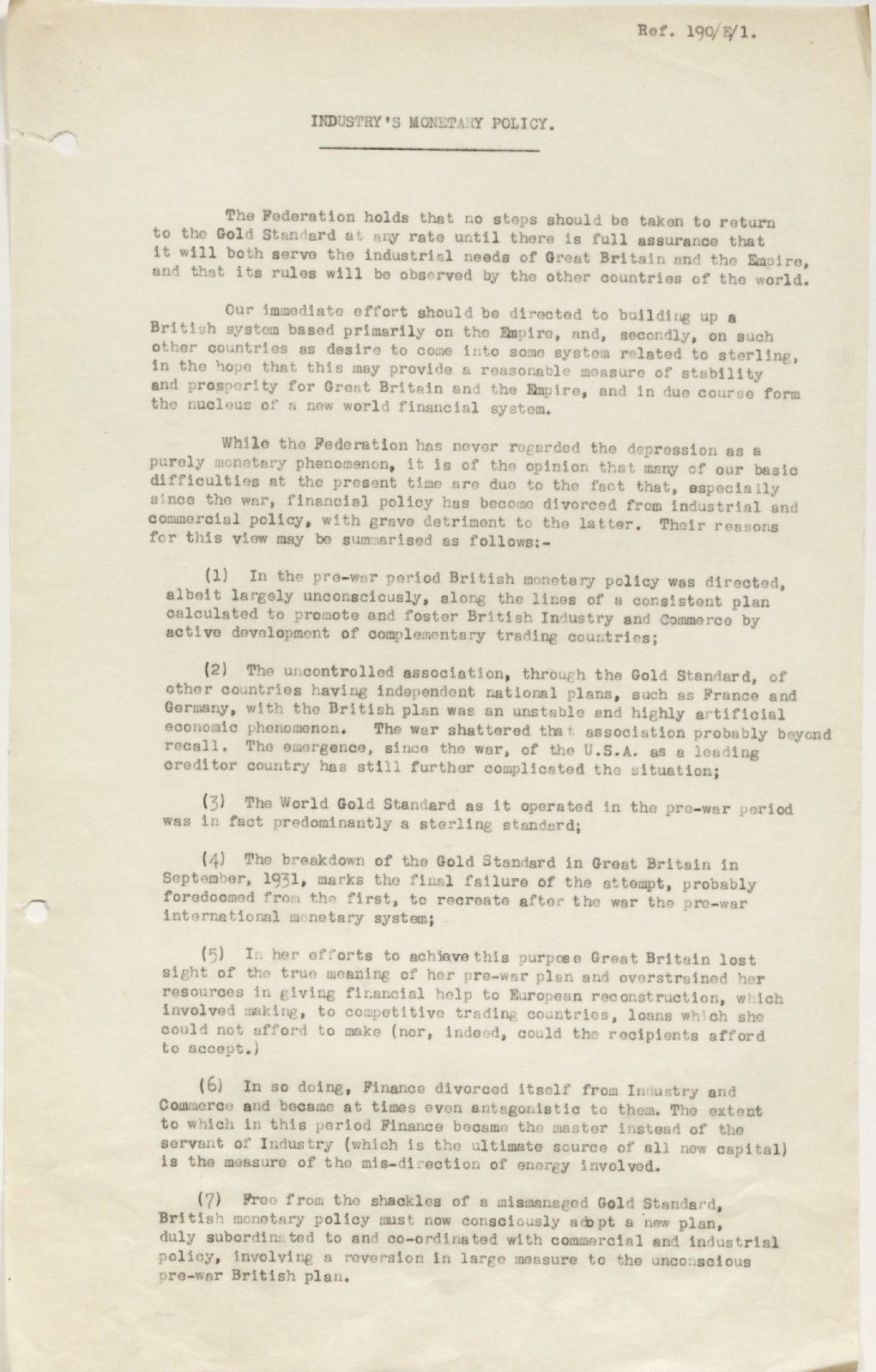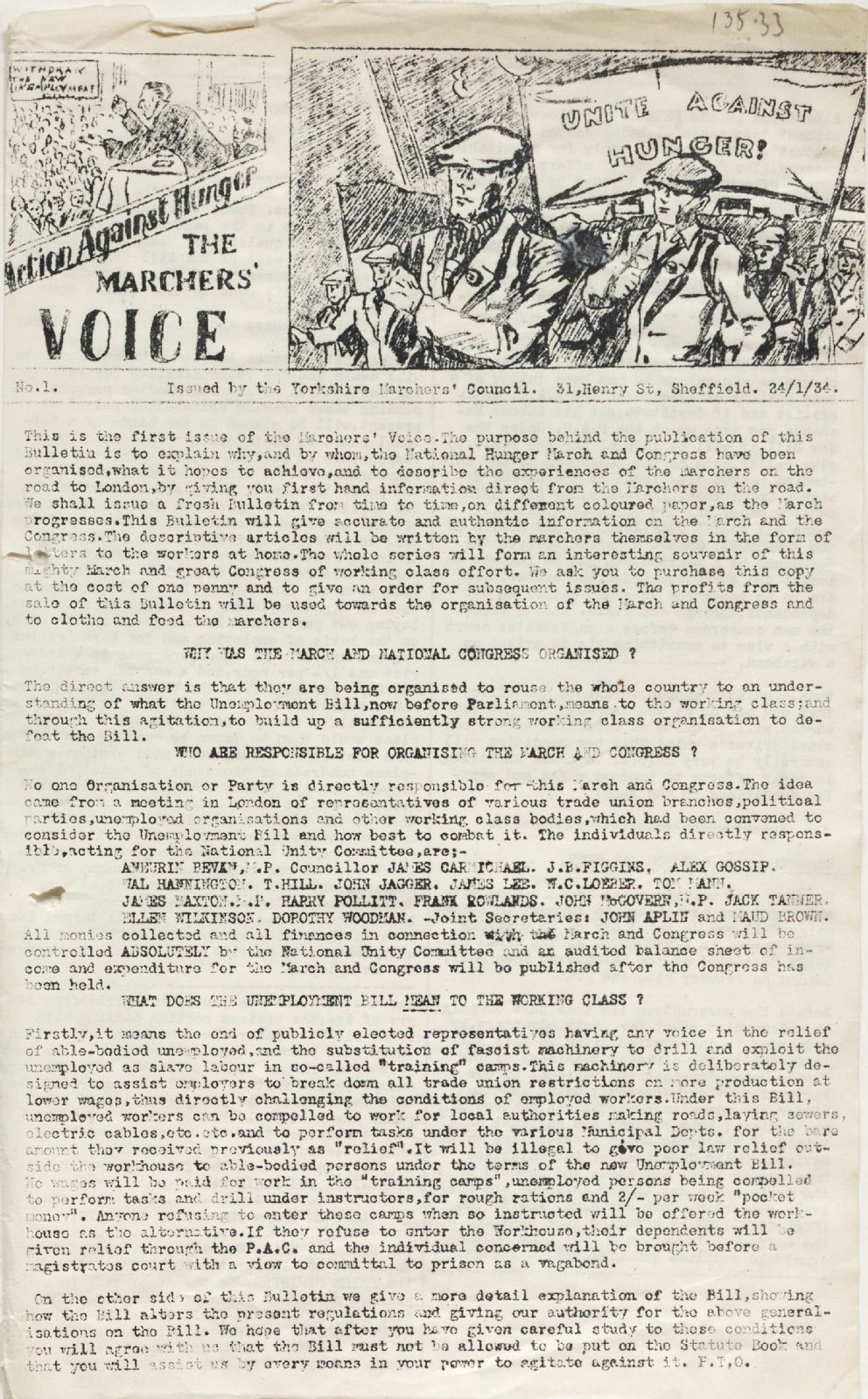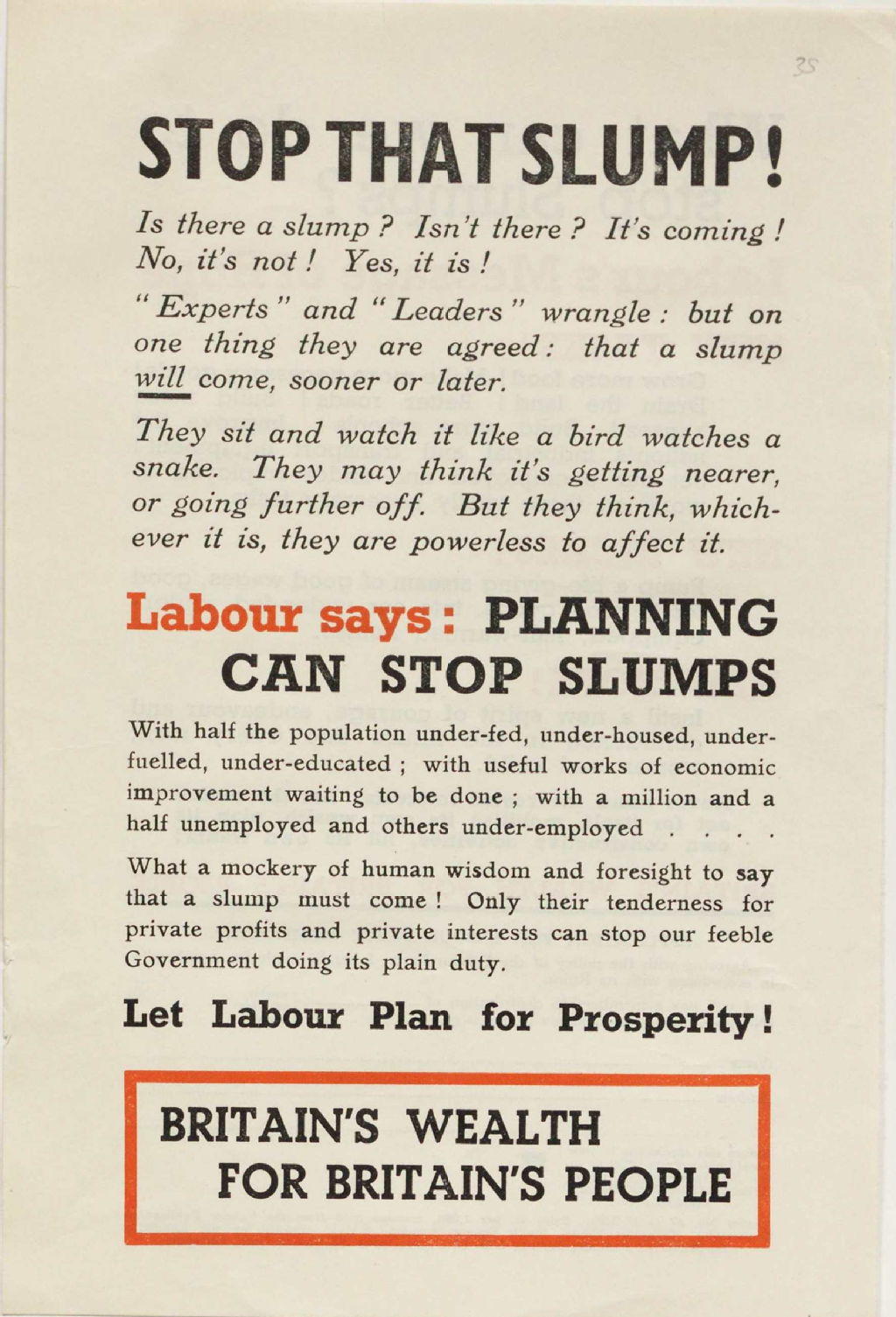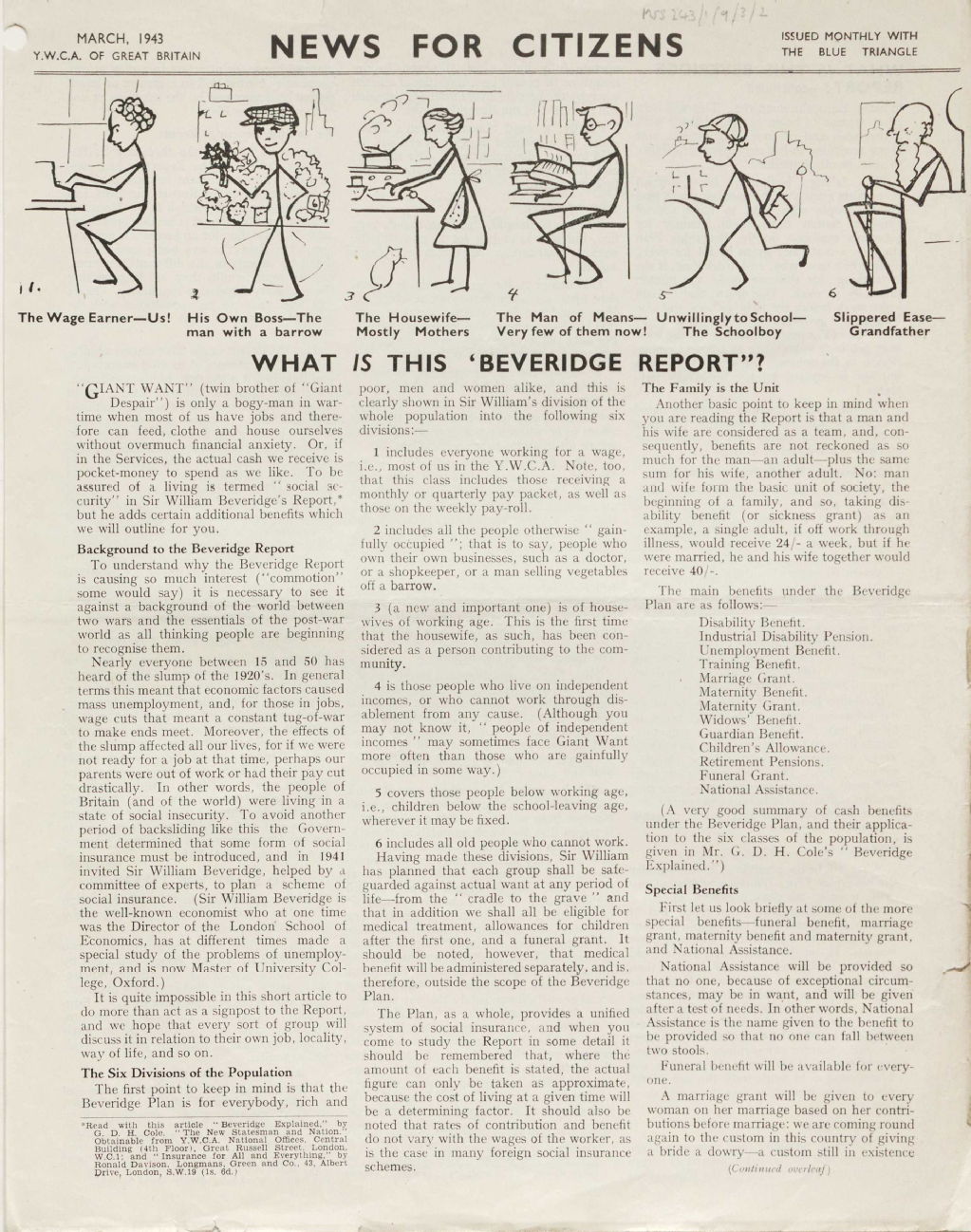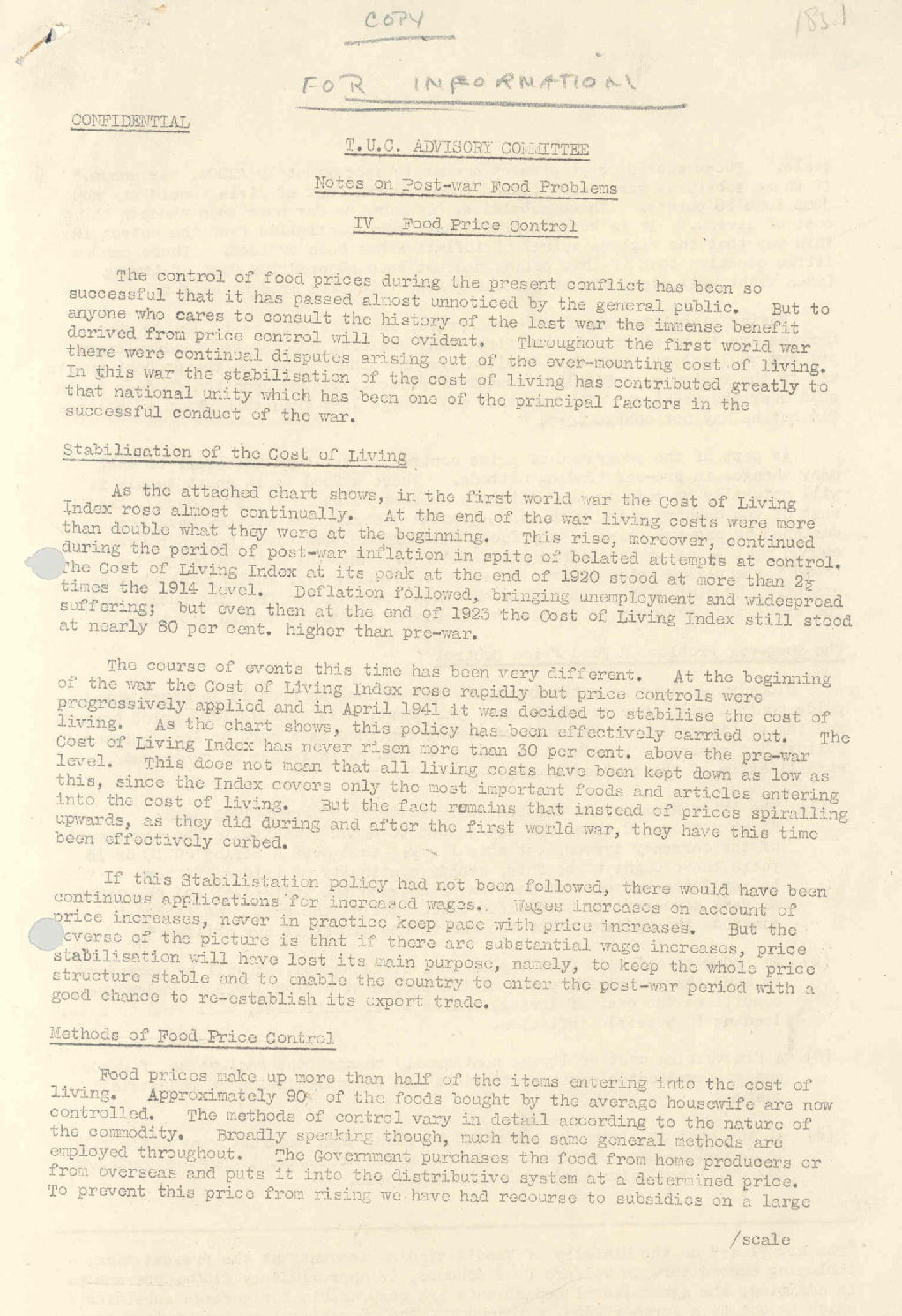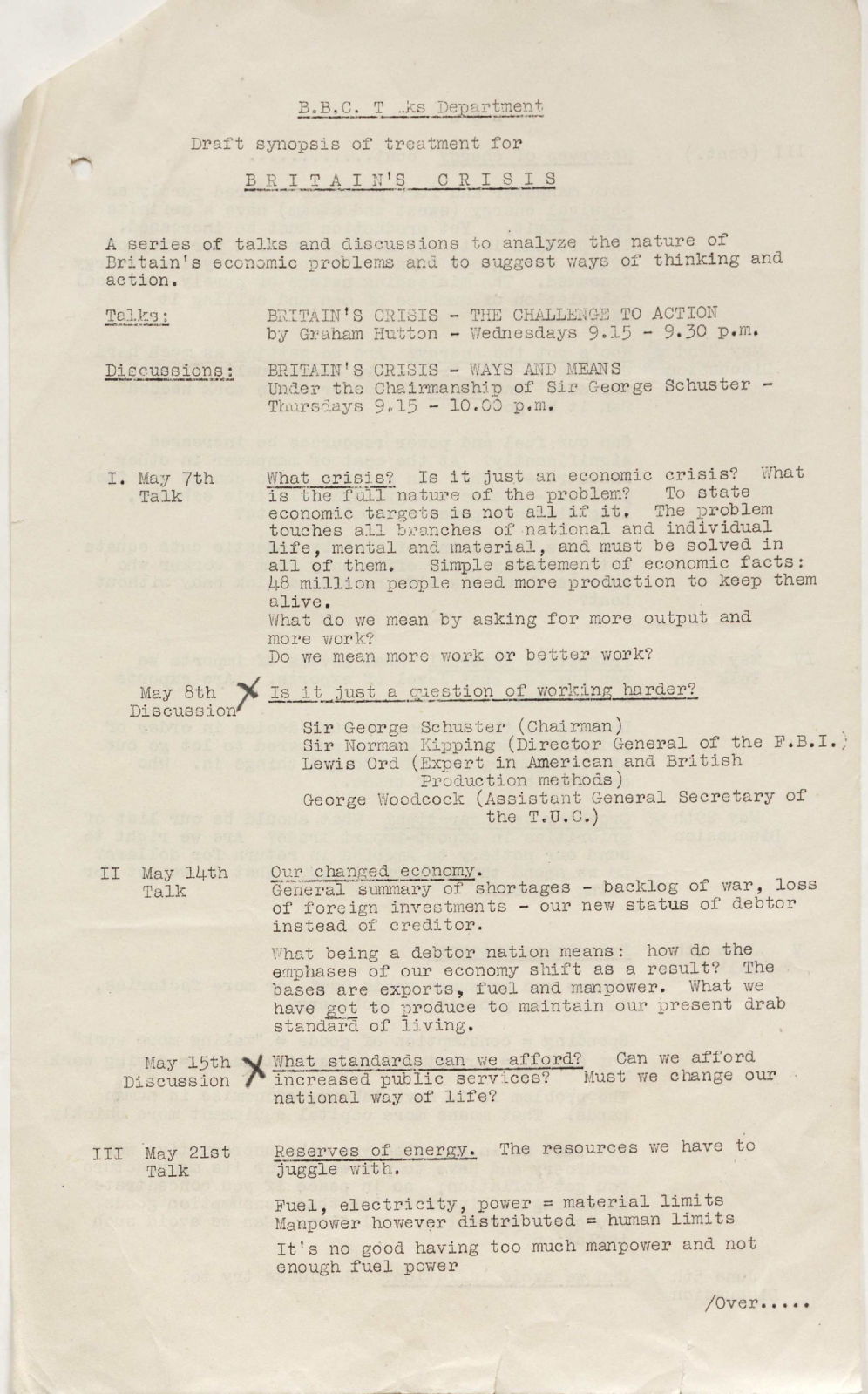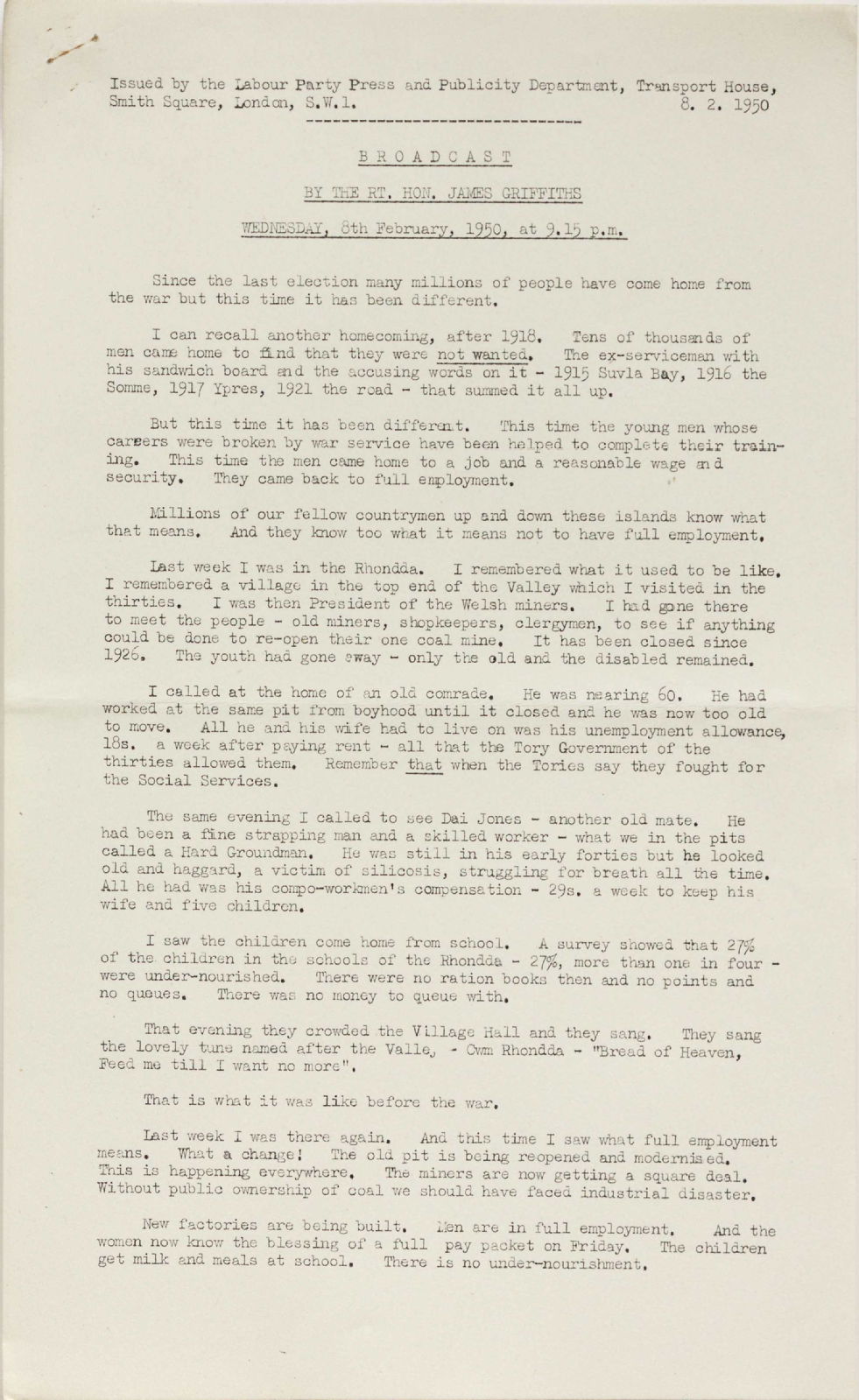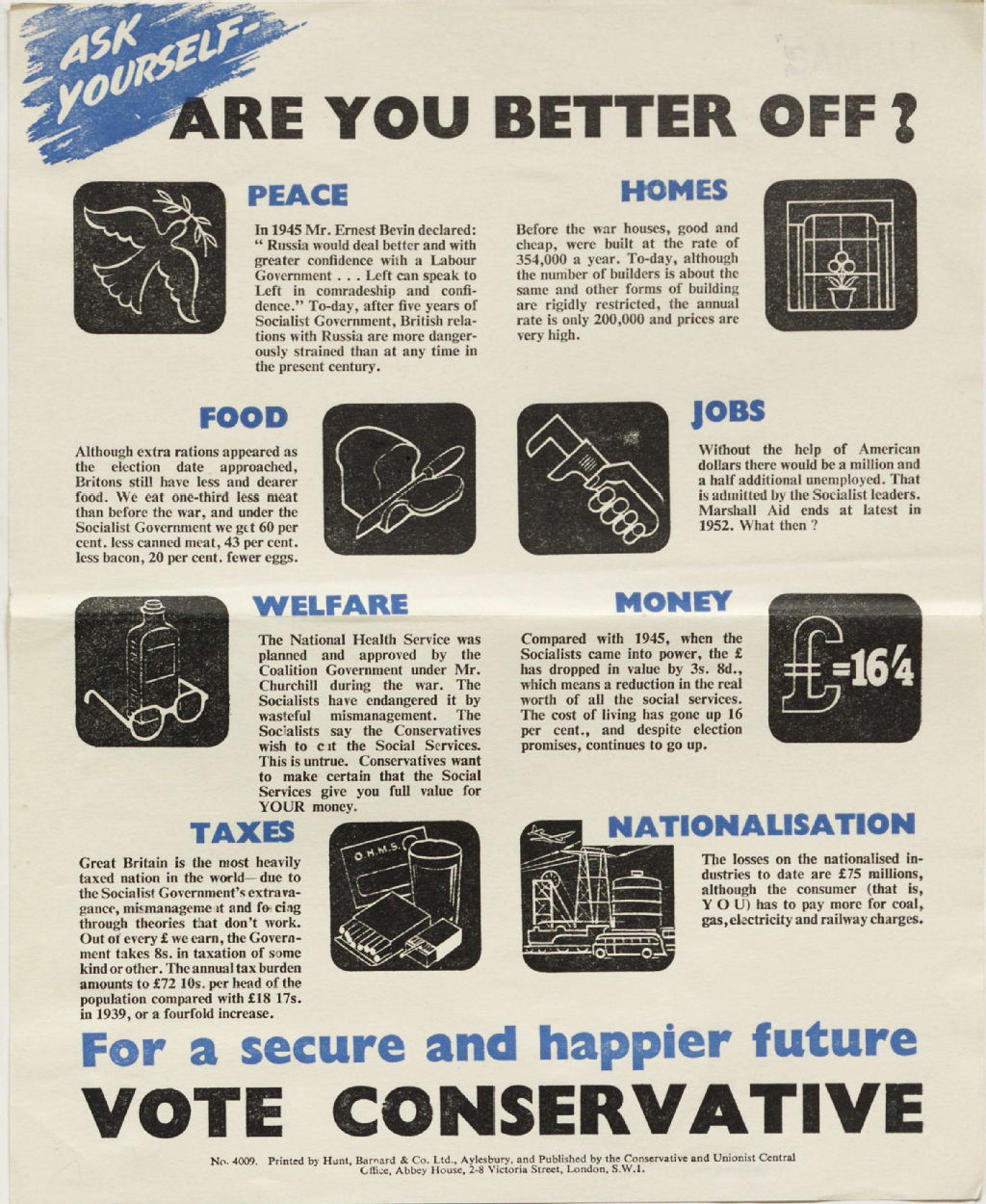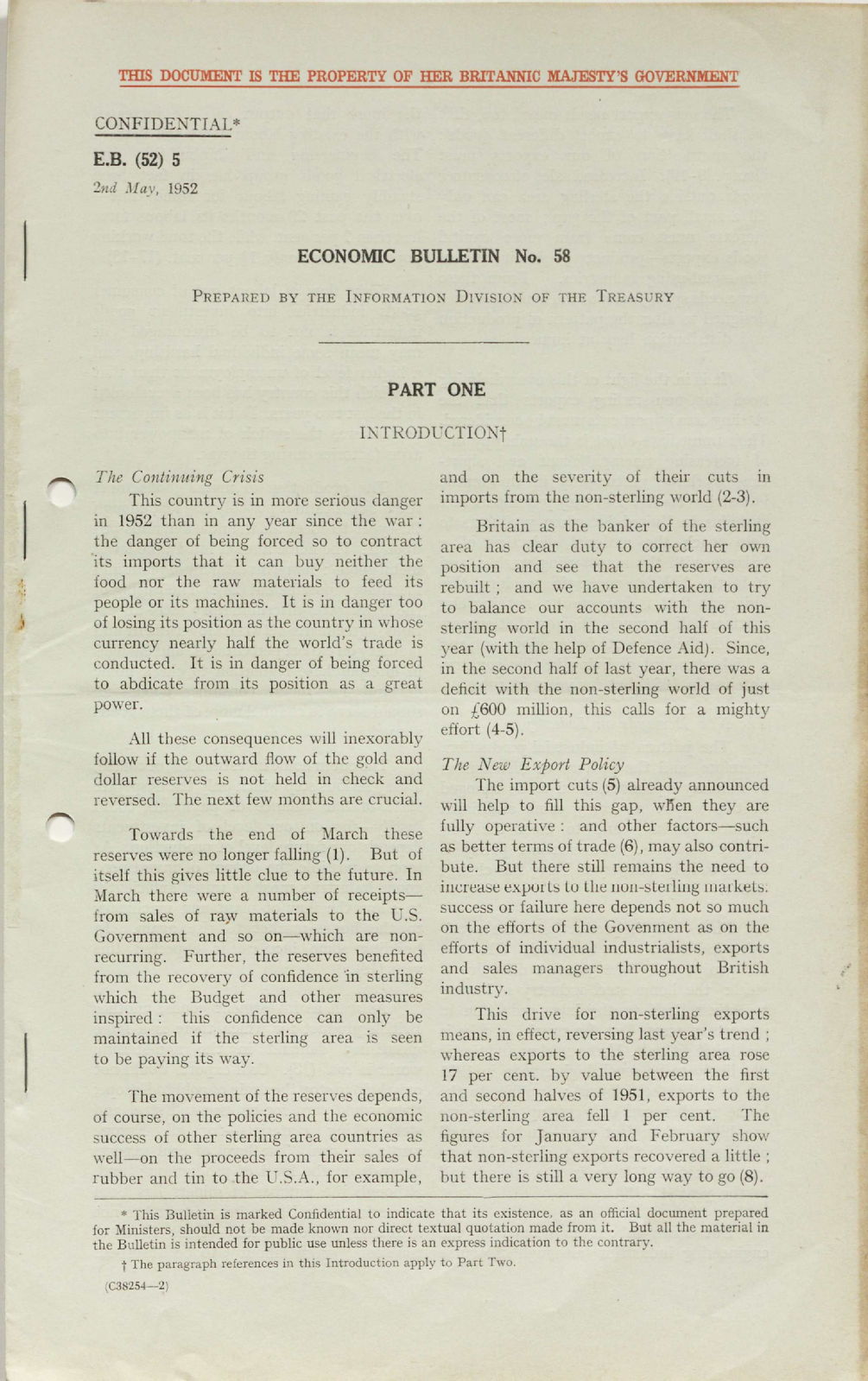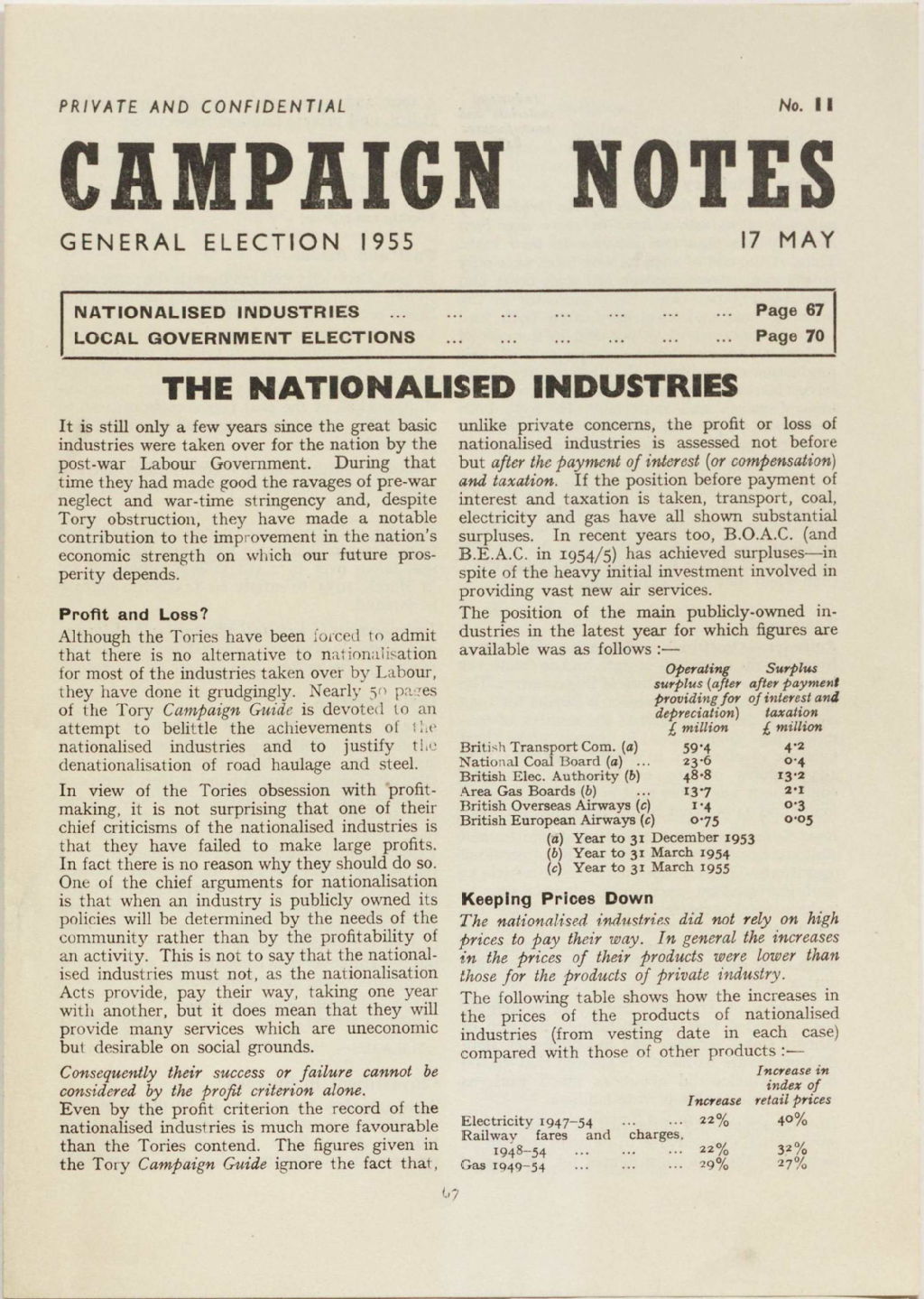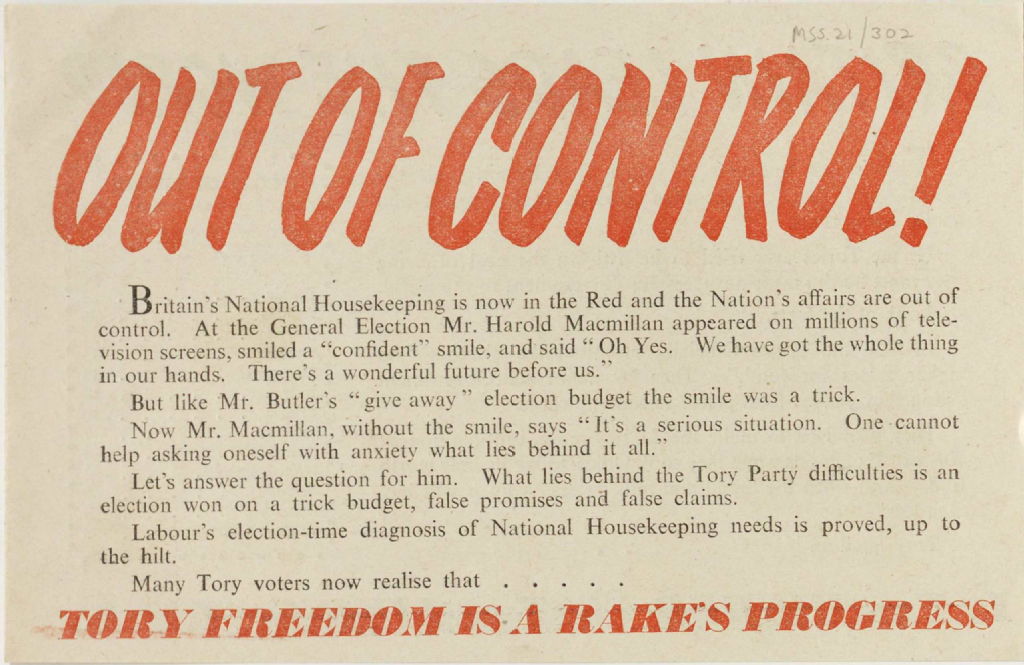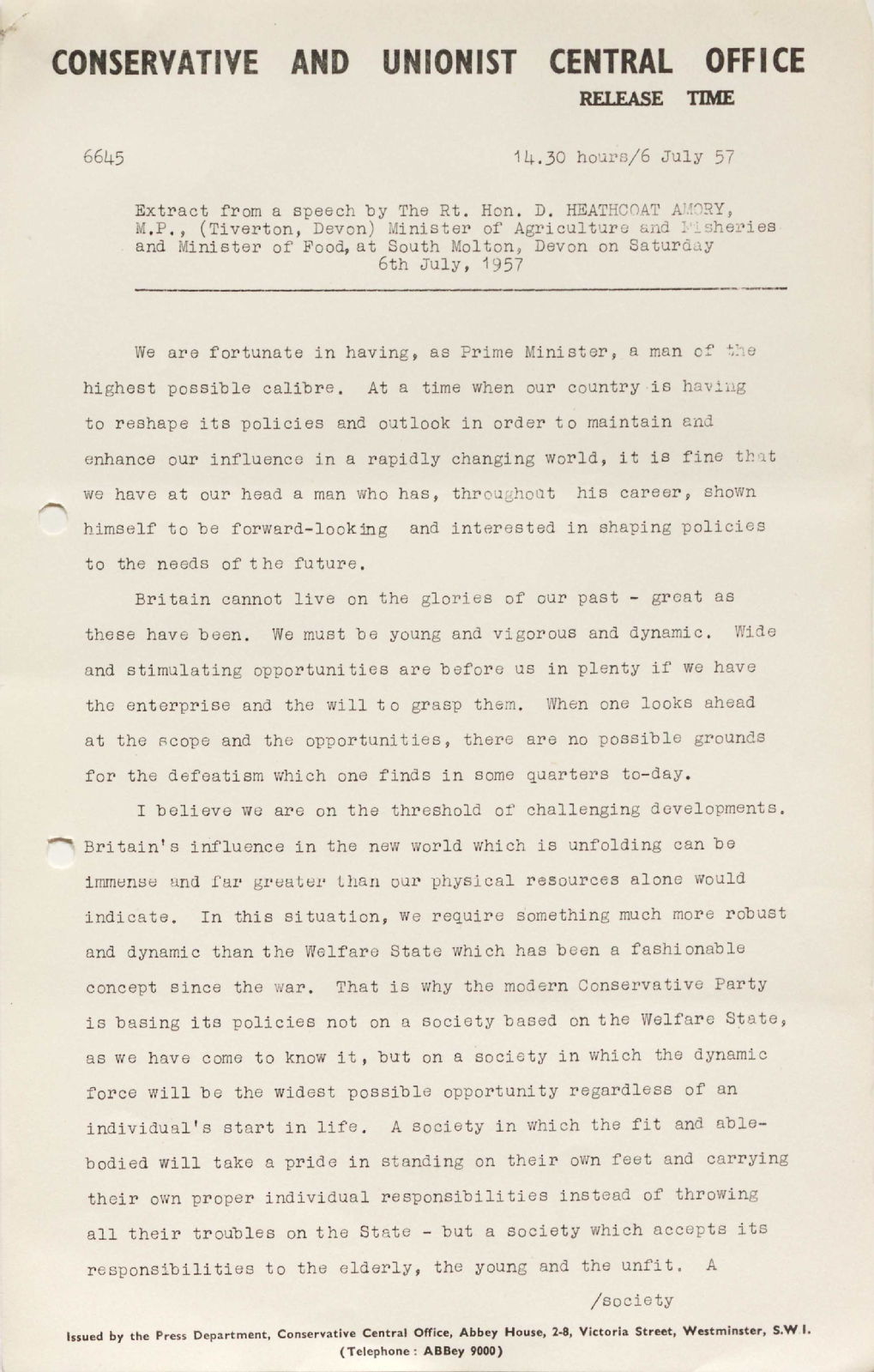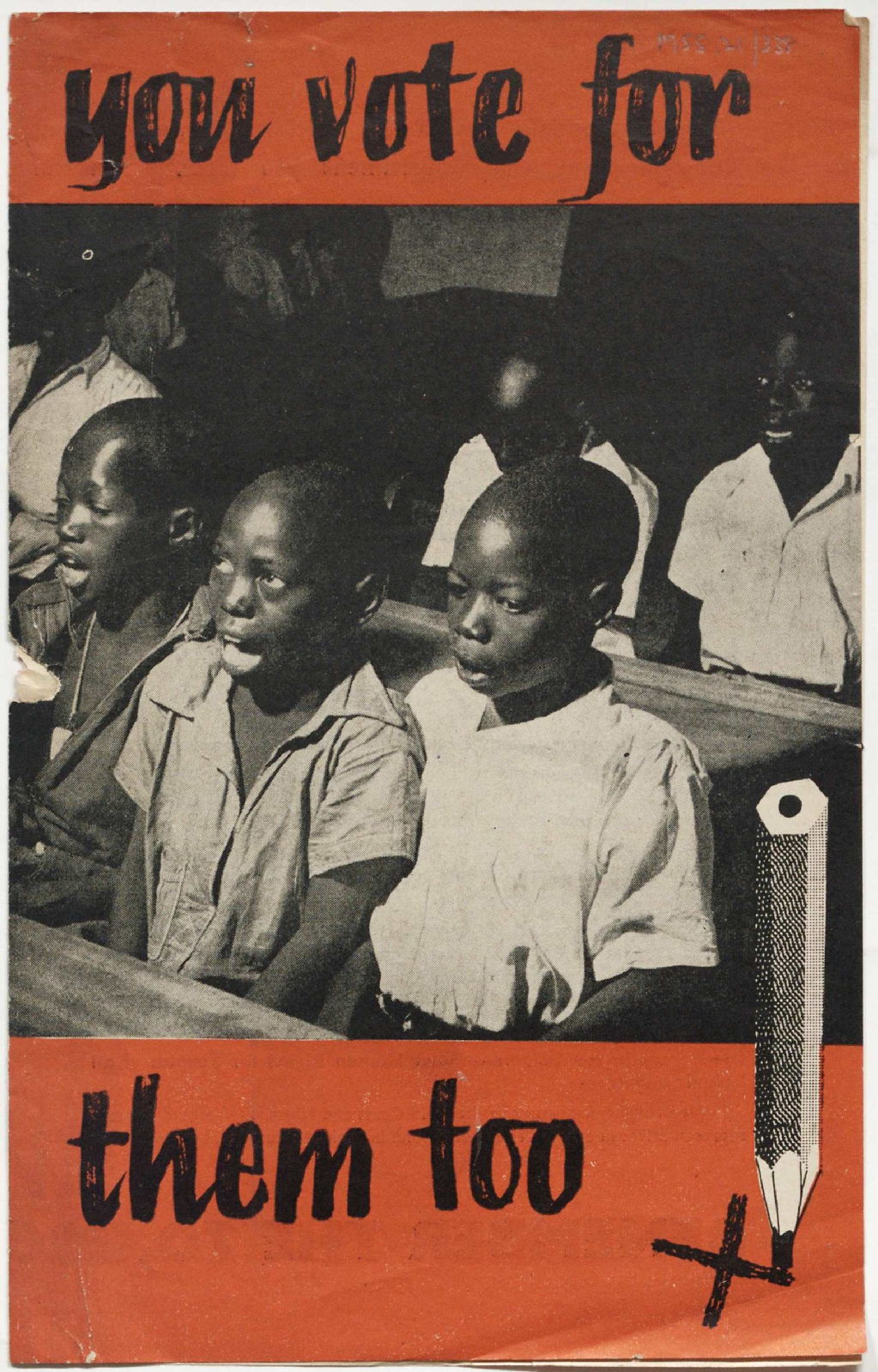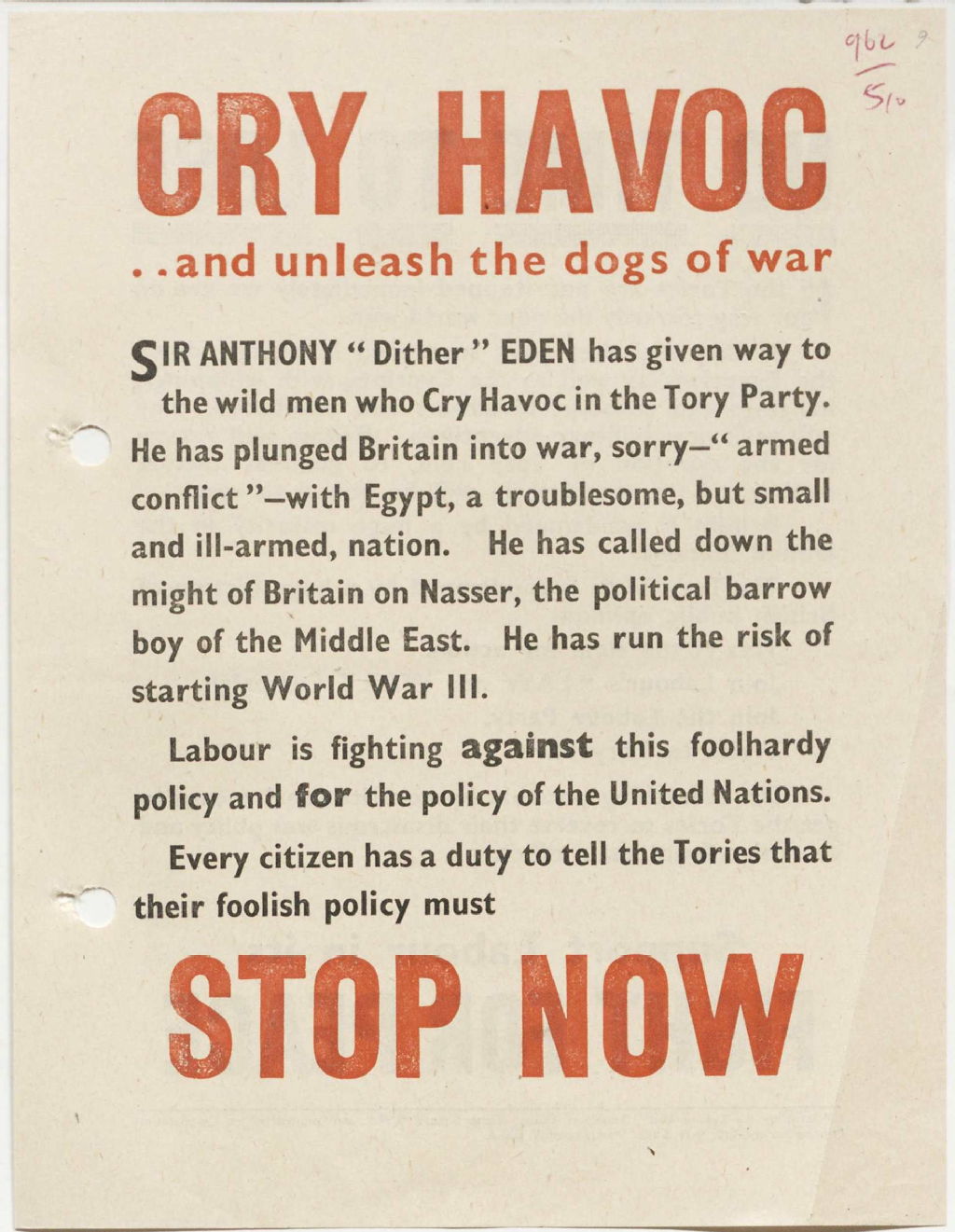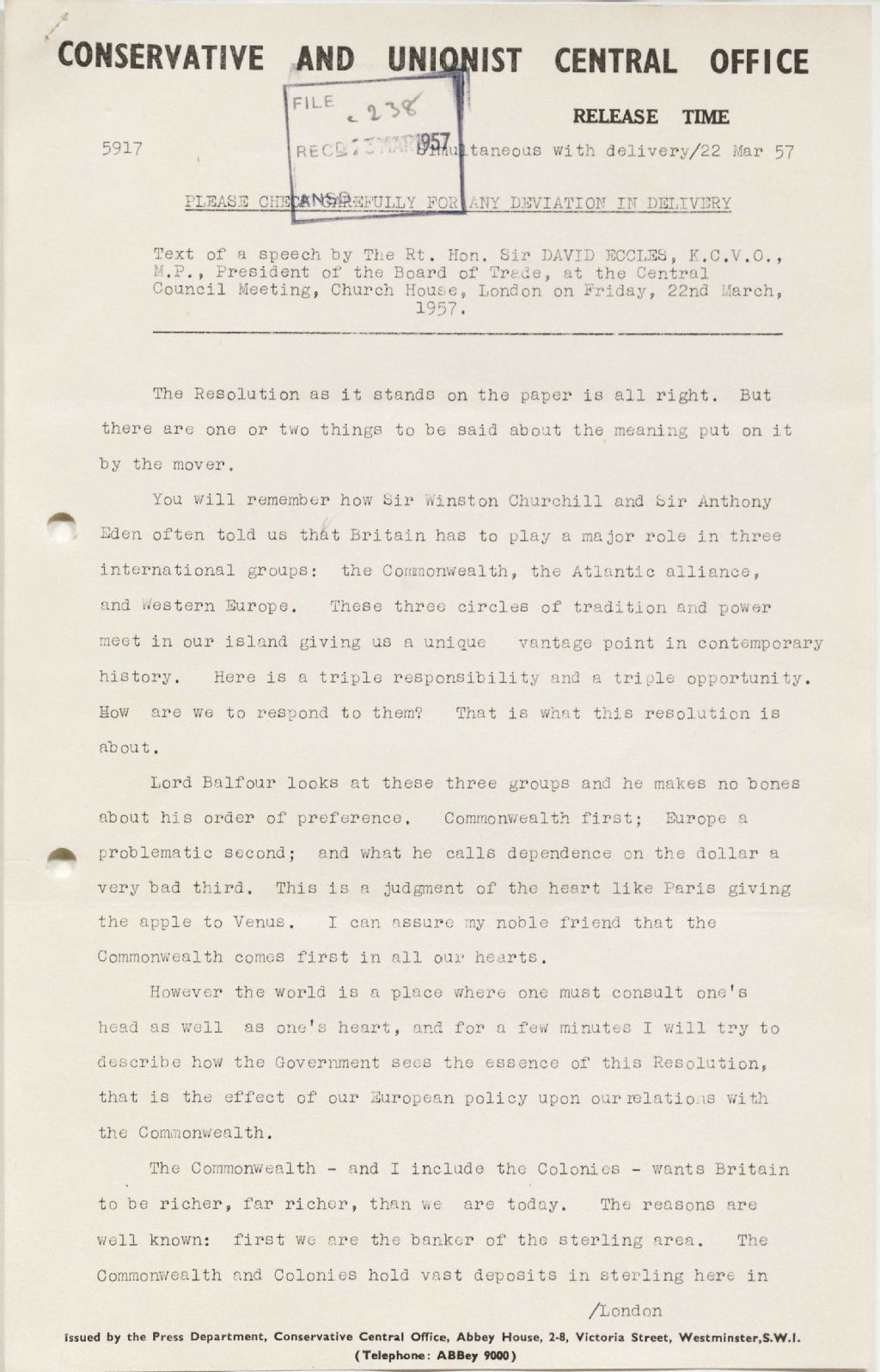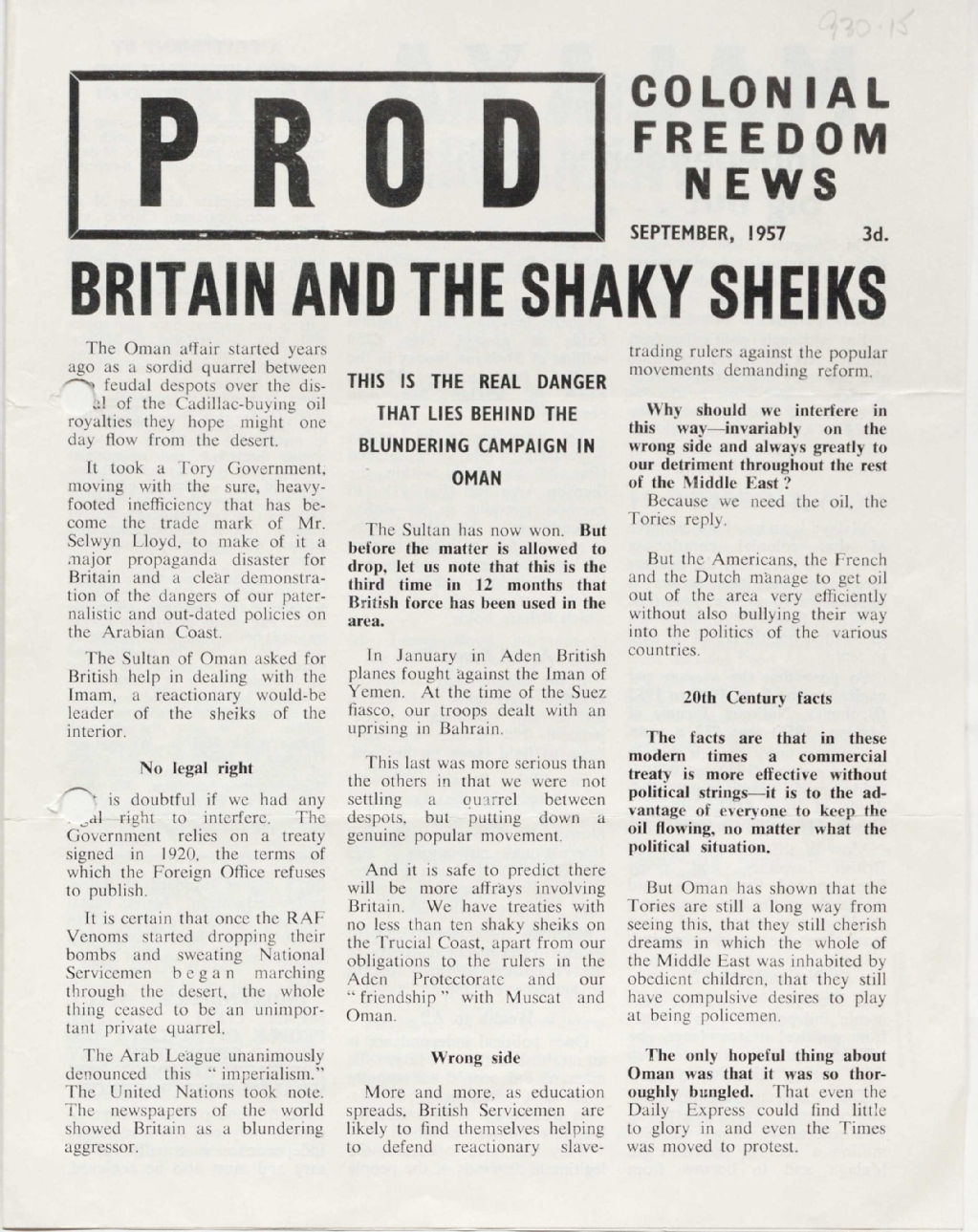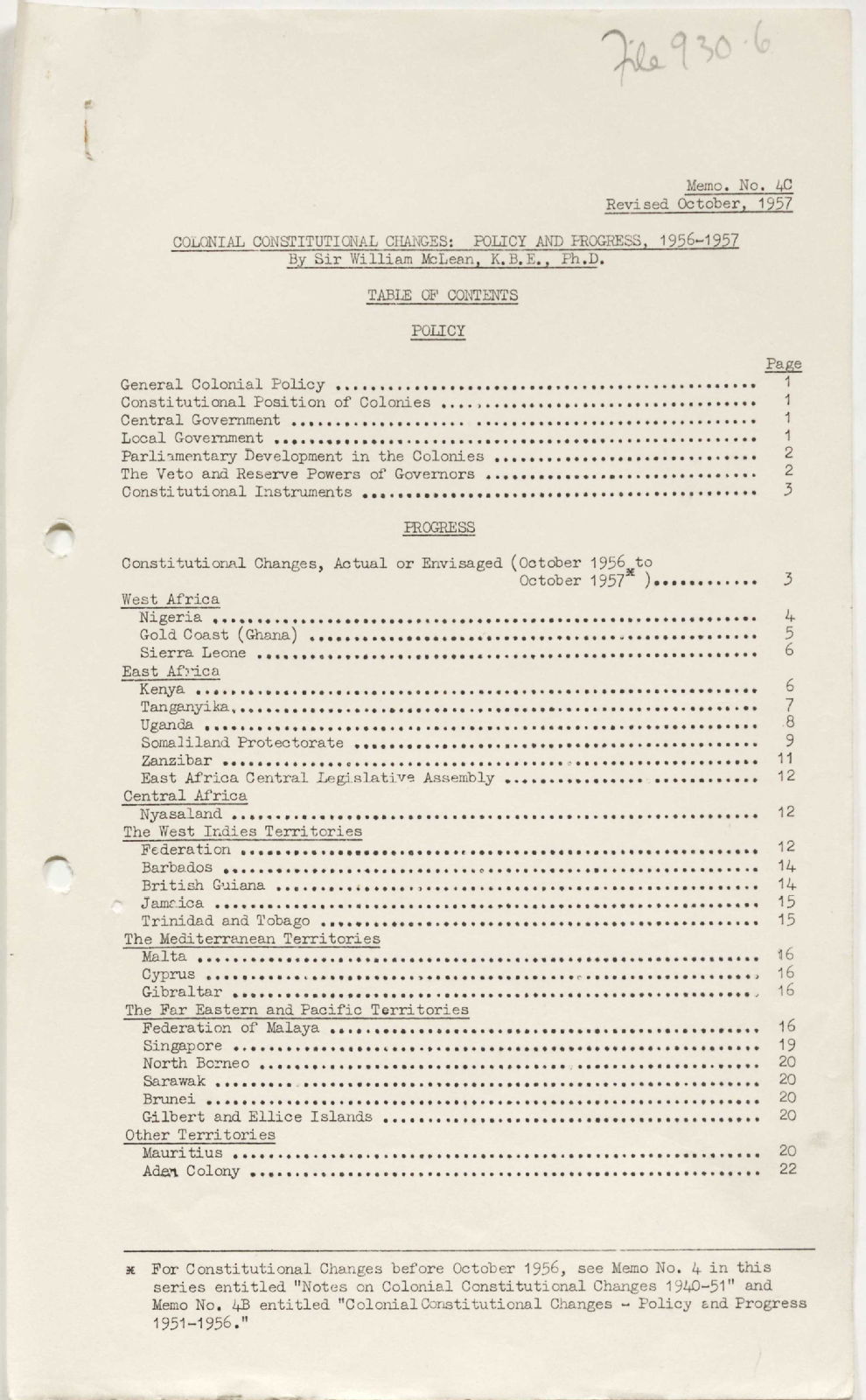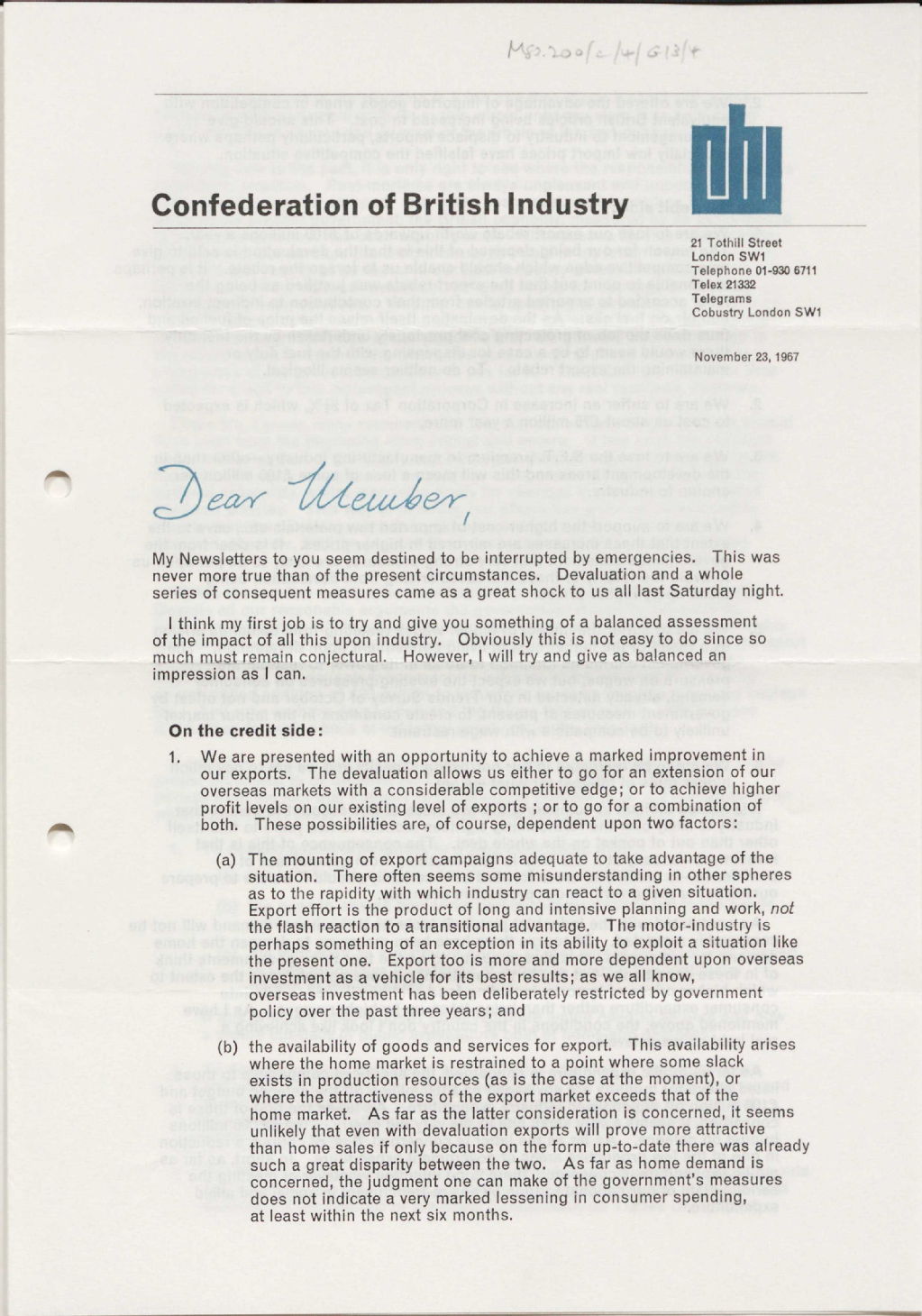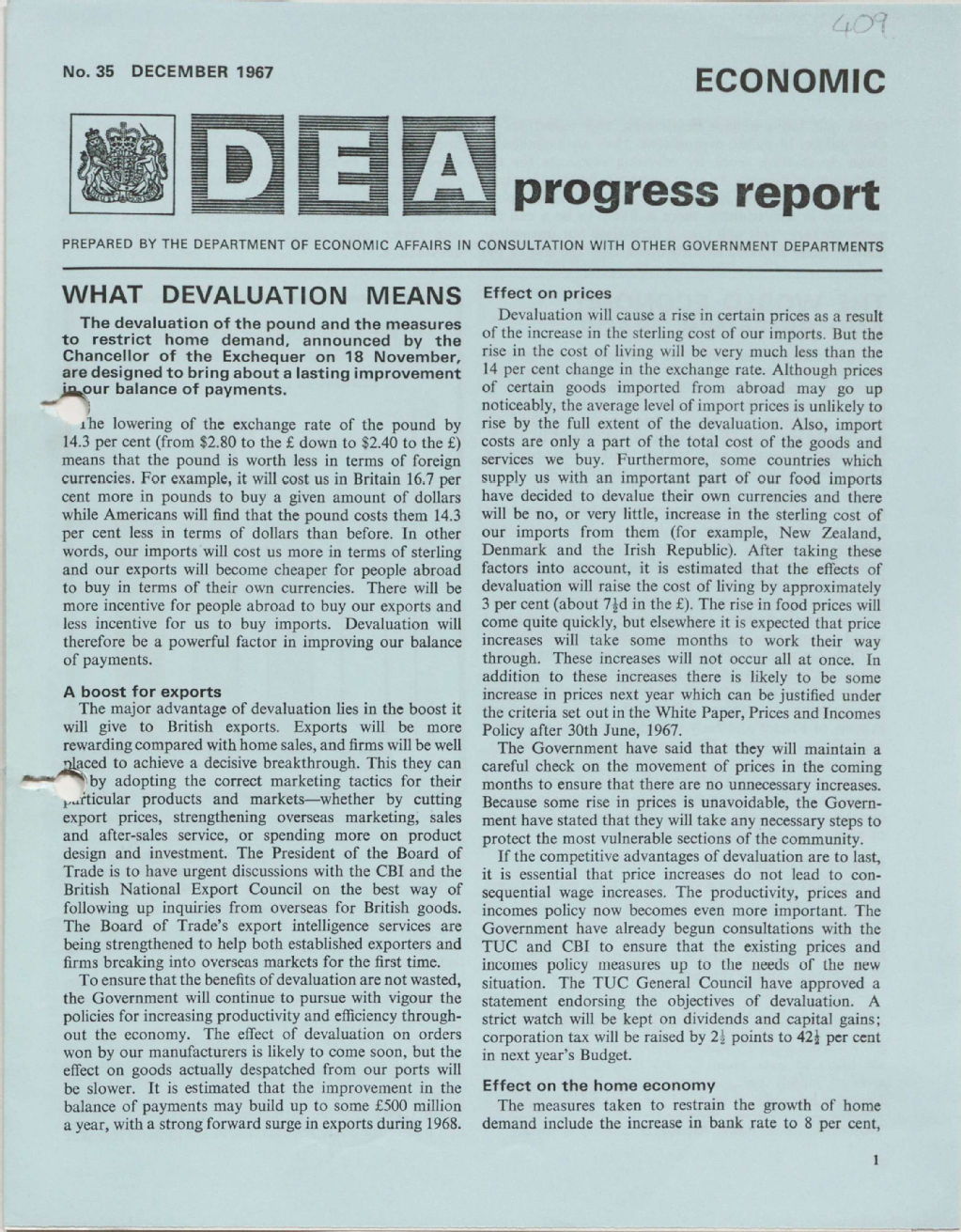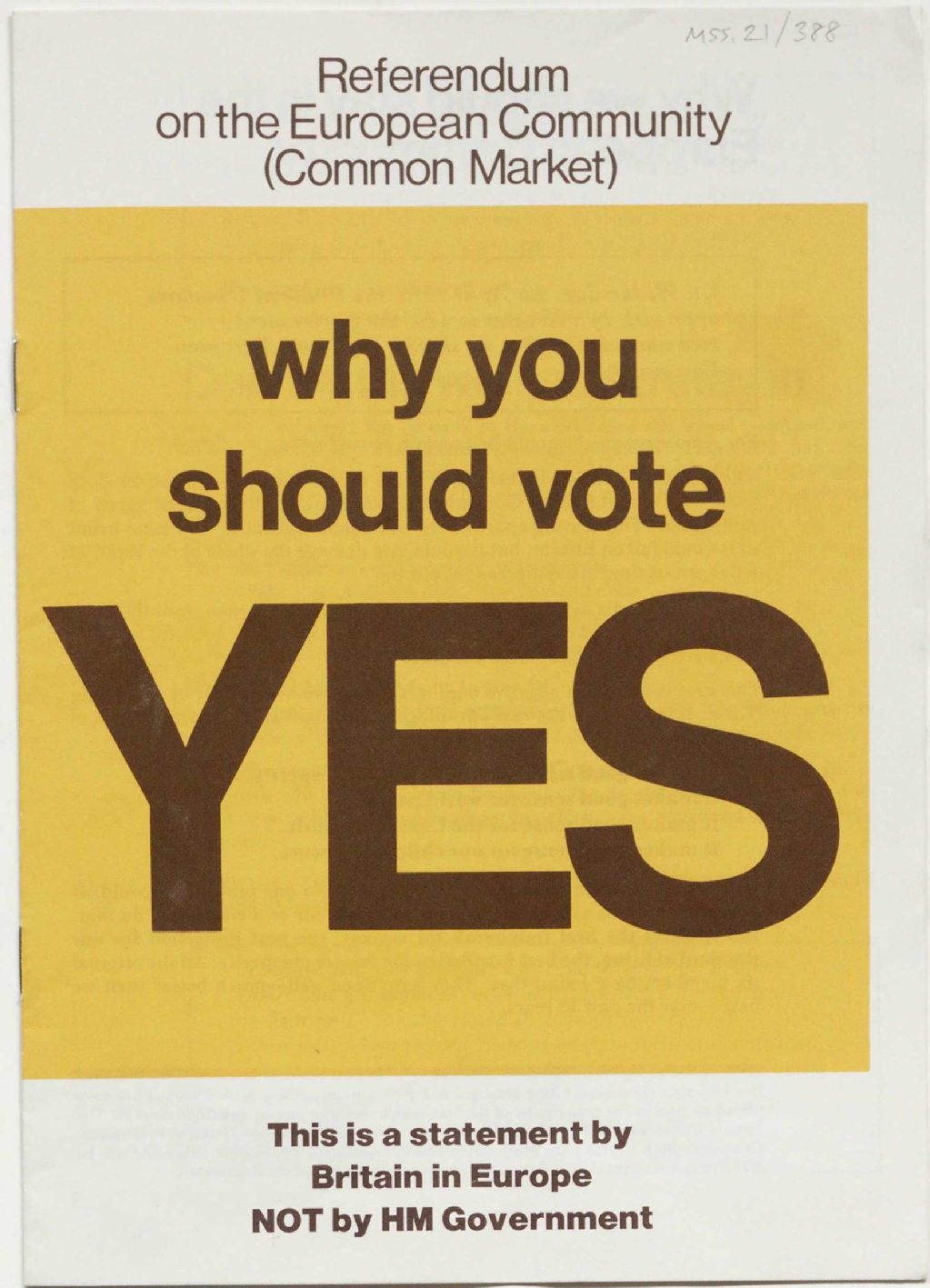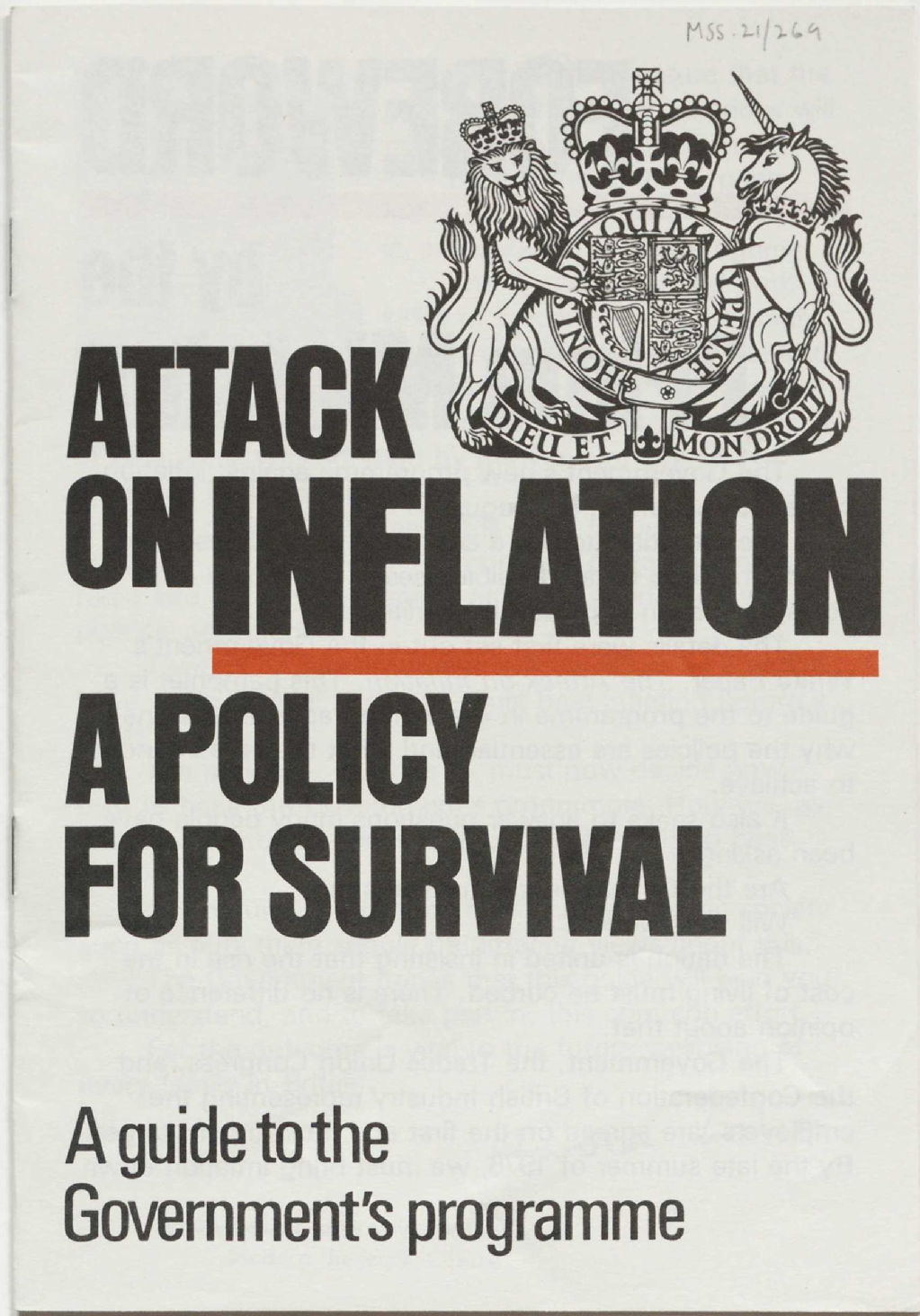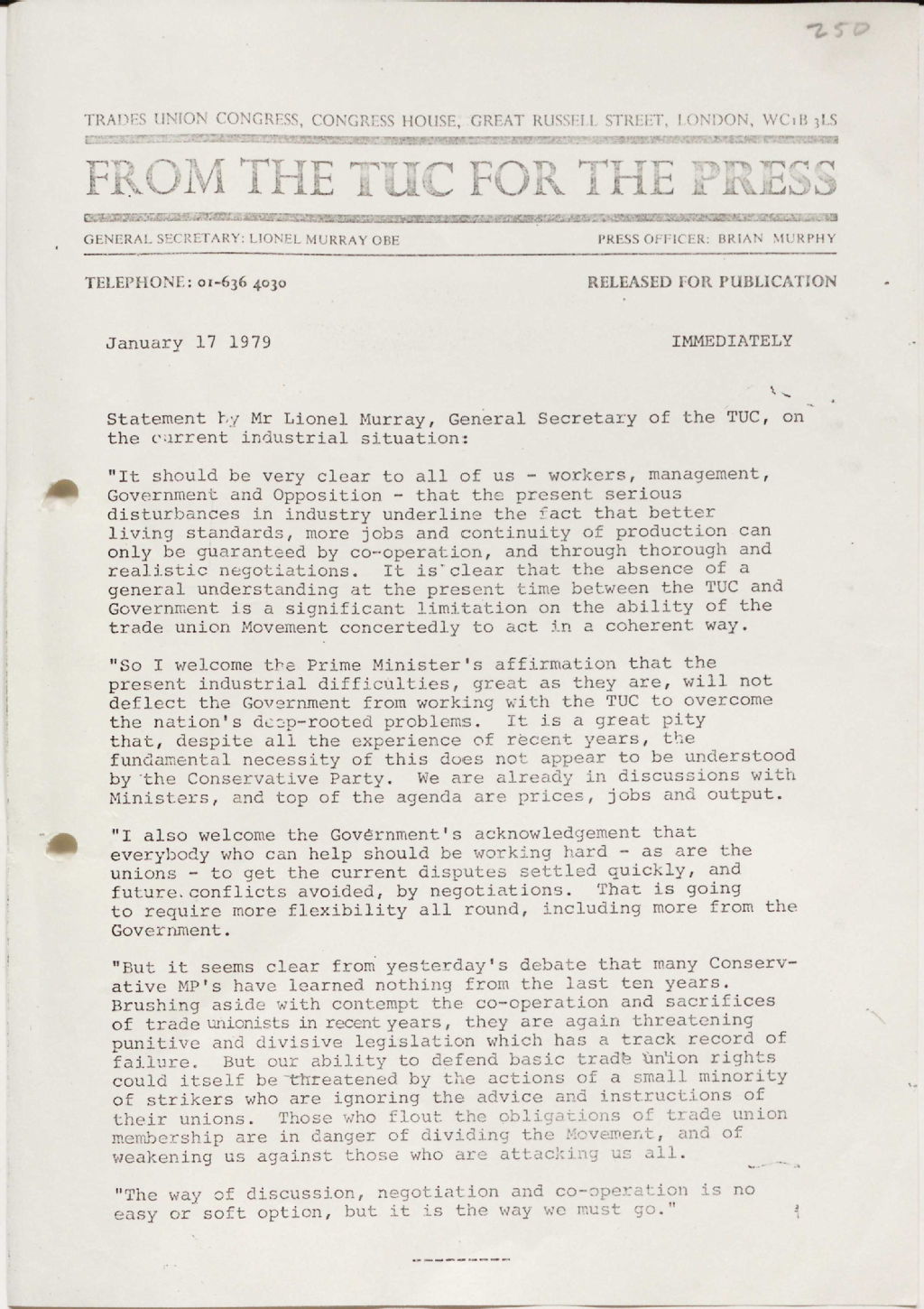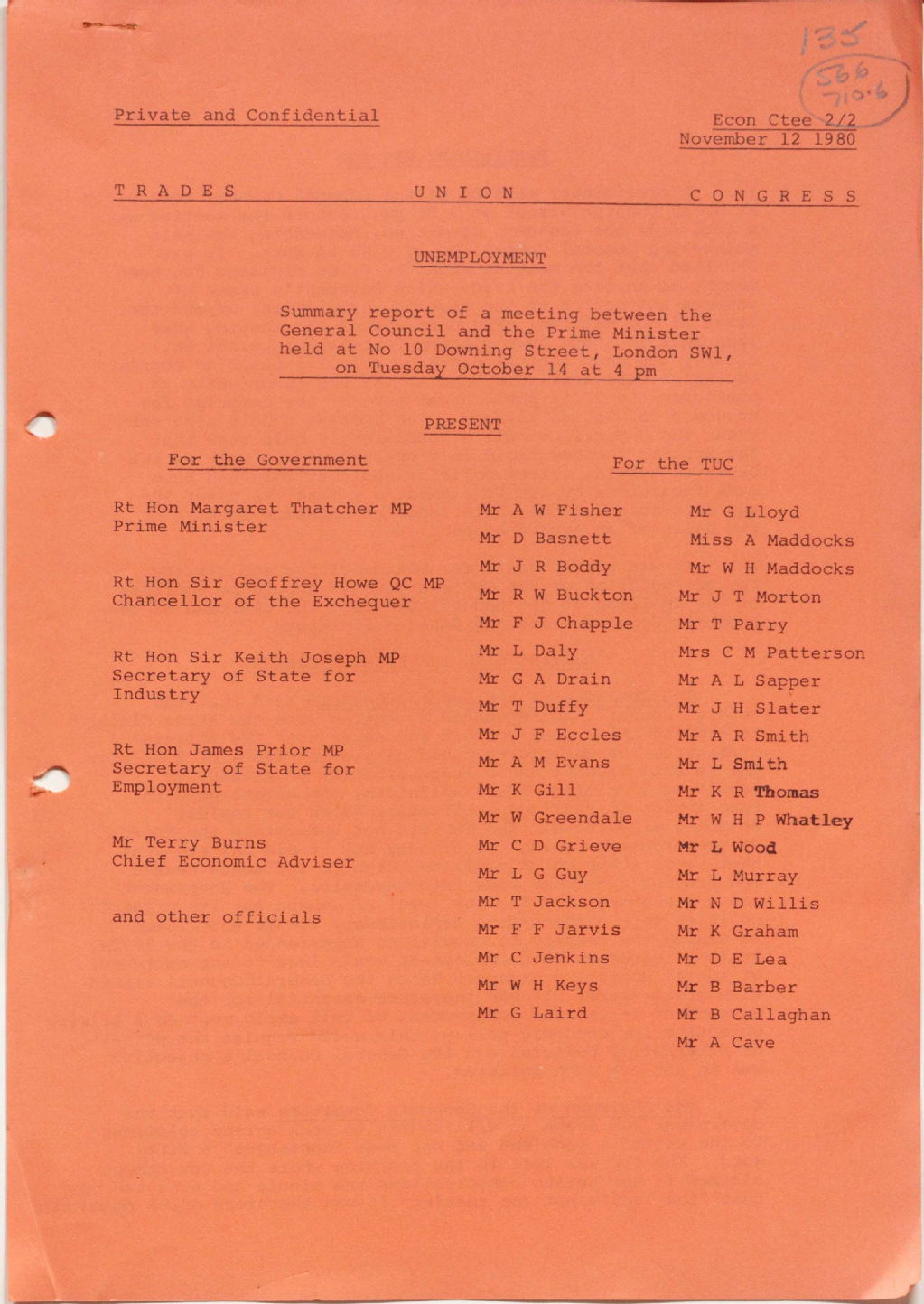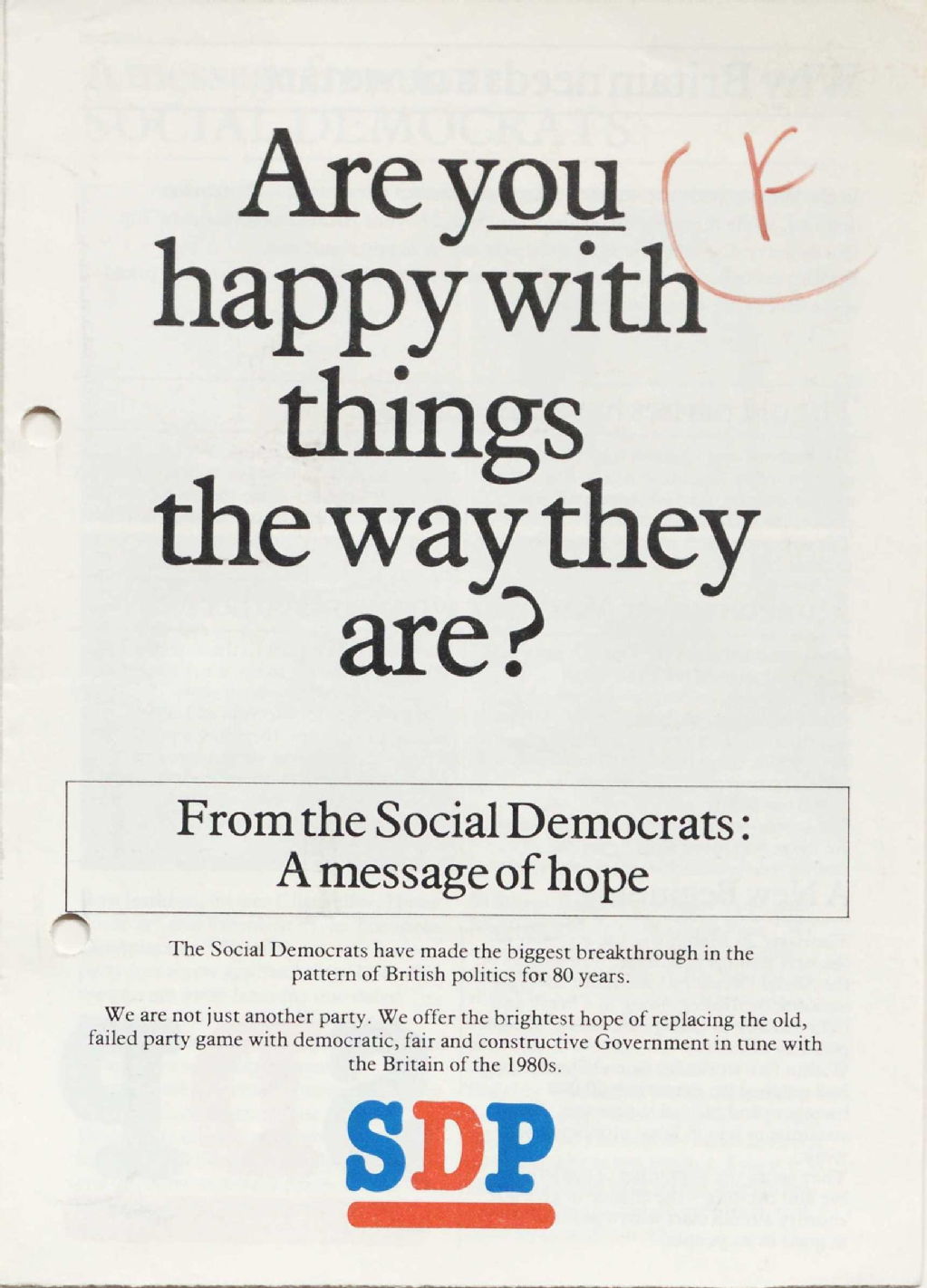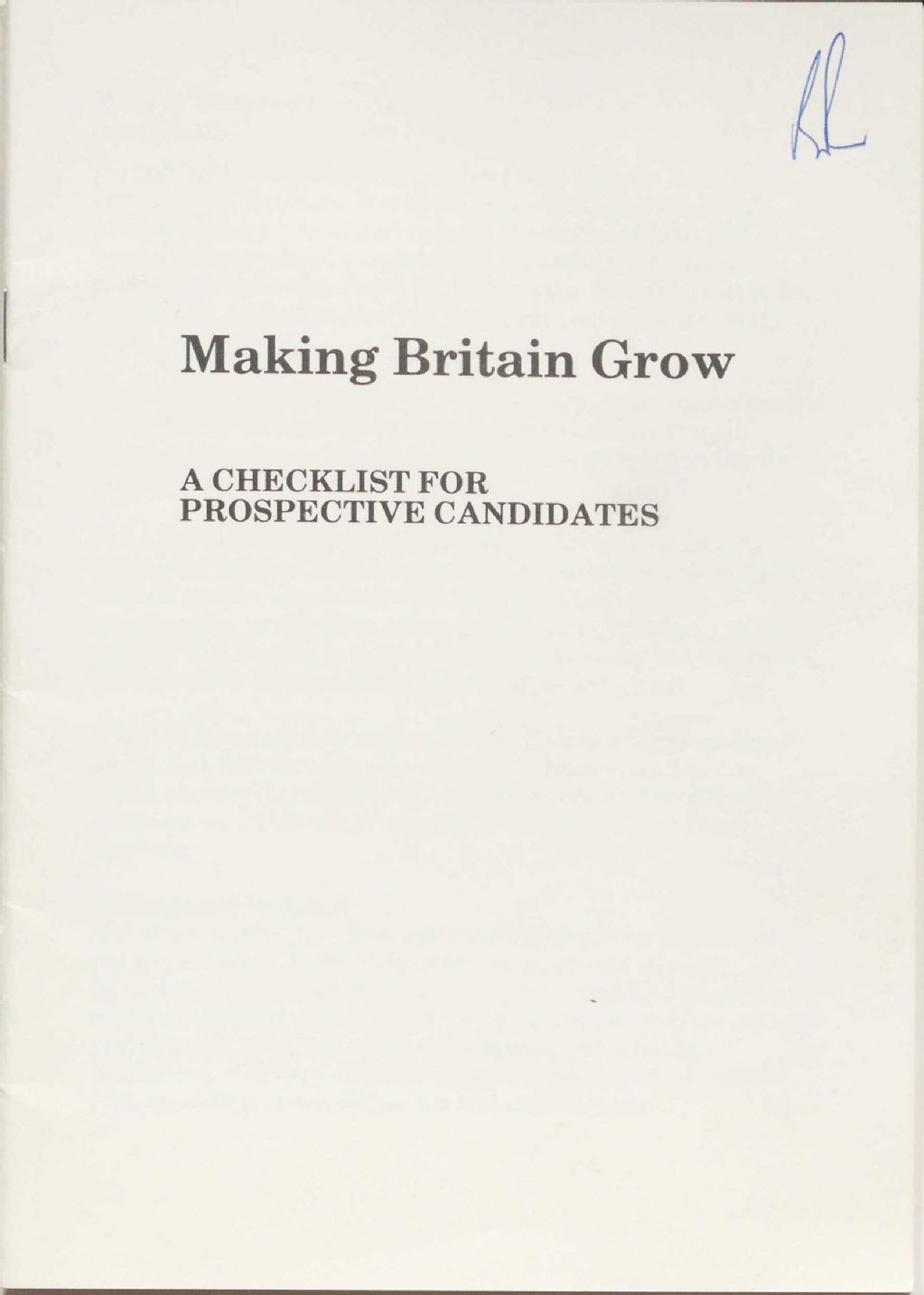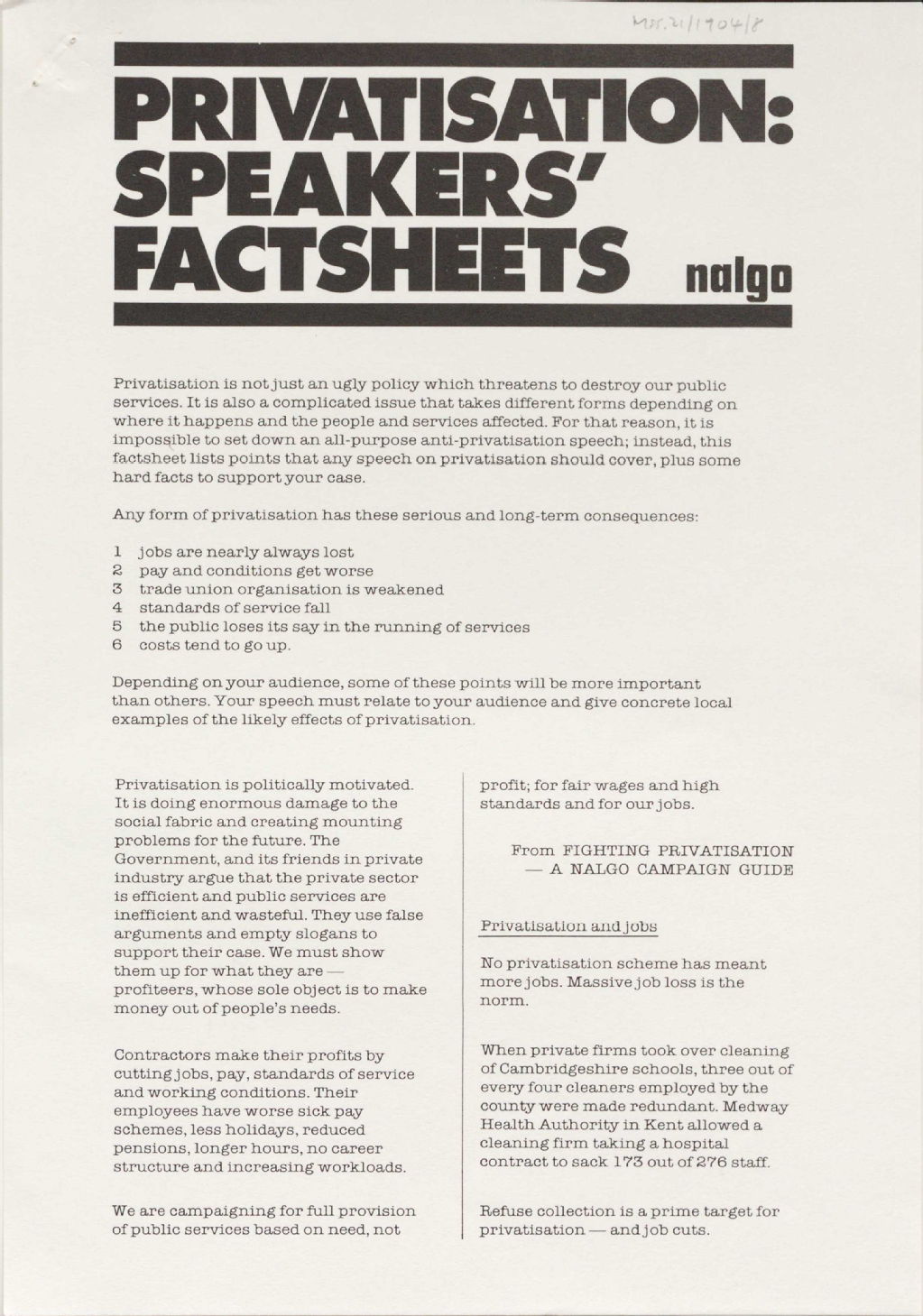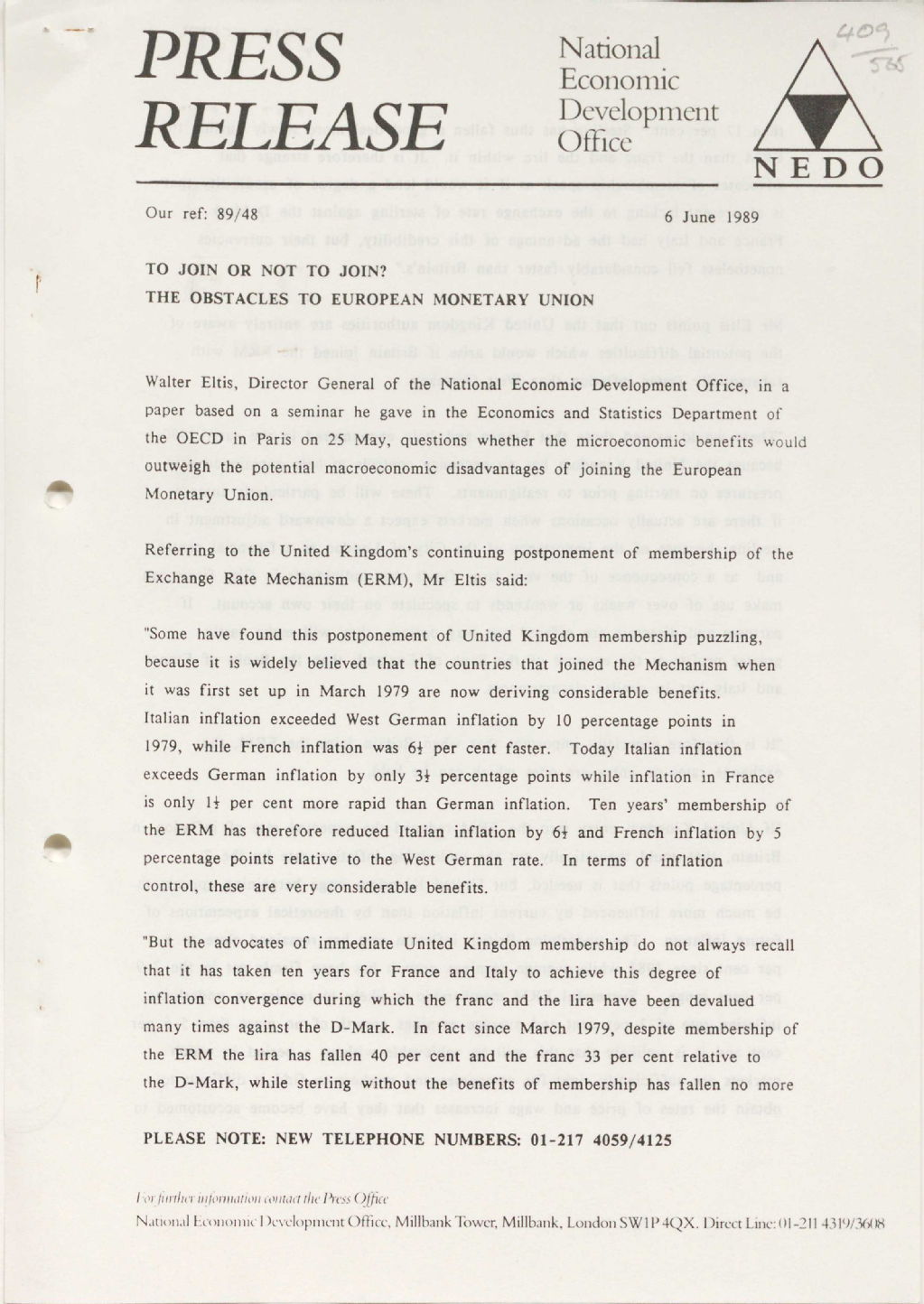Governing Britain (PO355)
About the Modern Records Centre:
The Modern Records Centre (MRC) holds internationally important collections for the study of political, social and economic history. Just a small selection of documents relevant to the course 'Governing Britain' have been digitised and are linked to below, many more sources are undigitised and can be seen by researchers at the Centre.
Most archive collections at the MRC come from trade unions, employers' organisations or individuals involved in the labour movement. They include the archives of major organisations such as the Trades Union Congress and Confederation of British Industry, and collections which belonged to trade union leaders and politicians such as Ernest Bevin and Richard Crossman. Many of the documents below therefore reflect the attitudes and opinions of the political left. Like many archives, the Modern Records Centre has only a few documents from the very recent past (e.g. past 20 years).
The Liberal State (1870-1945)
1. The Crisis of Liberalism (c.1870-1918)
Charting the problems associated with British relative economic decline, starting from the end of the 19th century to the end of the Great War. Particularly Britain’s problems in injecting rigour into the British economy and dealing with international competitors, while still maintaining the liberal state model. This week also includes Britain’s initial withdrawal from the Gold Standard.
'Great Reform Demonstration', Hyde Park, July 1884
Text of resolution to be read at a demonstration by the "unenfranchised classes" (organised by the London Trades' Council) in protest "against the rejection of the Representation of the People Bill by an irresponsible and unrepresentative House of Lords". The Representation of the People Act of 1884 was the third Reform Act during the 19th century (earlier Acts of Parliament had been passed in 1832 and 1867), and increased the numbers qualified to vote (through ownership or rental of property) to roughly 60% of adult males.
Other documents relating to this demonstration are available onlineLink opens in a new window.
Included in a volume of Trade Reports of the London Society of Compositors, 1884, from the archive of the London Society of Compositors; document reference: 28/CO/4/1/12.
Election address of G.H. Verrall, Conservative and Unionist candidate for Newmarket, 1906
One of the key issues in the 1906 parliamentary election was free trade versus tariff reform. This candidate argued that Britain should "arm itself with the weapons of trade" by introducing tariffs on imports from countries that taxed our own exports. Mr Verrall was defeated by the Liberal candidate.
Other election addresses issued by Conservative, Liberal and Labour candidates are included in the same volume and are also available onlineLink opens in a new window.
Included in a volume of general election addresses for the Eastern Counties District, compiled by the National Trade Defence Association (a lobbying organisation formed by representatives of the liquor trade); document reference: 420/NT/4/1/3.
Election address of R.W. Perks, Liberal candidate for Louth, 1906
This candidate takes the opposite view to Mr Verrall on the issue of tariff reform, arguing that tariffs will "tax the people's food". The Liberal Party won the 1906 general election in a landslide, partly due to divisions over free trade within the Conservative Party. Mr Perks was one of the successful candidates.
Other election addresses issued by Conservative, Liberal and Labour candidates are included in the same volume and are also available onlineLink opens in a new window.
Included in a volume of general election addresses for the Eastern Counties District, compiled by the National Trade Defence Association (a lobbying organisation formed by representatives of the liquor trade); document reference: 420/NT/4/1/3.
"A sound system of representative government"?, 1910
Circular letter from Sir Leslie Scott, Conservative and Unionist Member of Parliament for Liverpool Exchange. He outlines his reasons for opposing the Liberal Party's "Veto Bill" (passed in 1911 as the Parliament Act), which established the primacy of the House of Commons over the House of Lords and prevented the Upper House from blocking measures of social reform.
A 1905 Liberal Party leaflet which attacks the House of Lords for allegedly favouring vested rather than public interests is also available onlineLink opens in a new window.
Included in a file relating to Liverpool Exchange Parliamentary Division, from the papers of Sir Leslie Scott MP; document reference: 119/3/S/LI/1.
'The Stuffed Lion in the Path of Democracy', 1918
Cartoon from the socialist newspaper The Daily Herald by Will Dyson. The 1918 British general election took place just over a year after the Bolshevik revolution in Russia. Dyson accuses the Liberal Party leader Lloyd George of scaremongering. The voters, who represent "Democracy" in the cartoon, included for the first time all men over the age of 21, regardless of income, and women over the age of 30 who fulfilled certain property qualifications. The election saw a significant increase in votes cast for the Labour Party.
Included in 'Old King Coalition', a collection of cartoons by Will Dyson, 1918, from the archive of the Transport and General Workers' Union; document reference: 126/TG/238/1/2.
Documents relating to the women's suffrage movement during this period are included in the online resources for Feminism, Politics, and Social Change in Modern Britain. Documents relating to the First World War and Britain are included in the online exhibition First World War 100: conflict and commemoration.
2. Liberalism strikes back (1918-1931)
This section features Britain’s return to the Gold Standard and the attempt to return to a liberal state model after the Great War. Particularly important moments in this period include the level of labour unrest, and the beginnings of the Great Depression.
Draft memorandum on the proposed return to the Gold Standard, 1925
This memorandum was written by R.C. Glenday of the Economic Department of the Federation of British Industries (a precursor to the Confederation of British Industry or CBI). He comments on Britain's financial position and the pros and cons of returning to the Gold Standard.
Included in a file on 'National Finance. Return to the Gold Standard', 1922-1925, from the archives of the Federation of British Industries; document reference: 200/F/3/E1/4/1.
Rufford Star, no.12, 13 February 1926
The Rufford Star was a Communist bulletin published for miners at Rufford colliery, near Mansfield. This issue was produced in the run up to the General Strike of May 1926, called by the Trades Union Congress to support the Miners’ Federation of Great Britain in their dispute over the cancellation of national agreements, reduction of wages and increase in working hours imposed by mine-owners. The bulletin includes political propaganda and descriptions of the conditions of the local miners and unemployed.
Included in a file on Communism, 1920-1929, from the archives of the Trades Union Congress; document reference: 292/770/2.
General Strike news bulletin of the Daily Mirror, 8 May 1926
Broadcasts by the BBC and brief news bulletins were one of the main sources of information during the General Strike, as the strike of printing and transport workers made the publication and distribution of newspapers difficult. This bulletin was published on the fifth day of the strike and includes information on the progress of the strike and public disorder (from a pro-government point of view).
Included in a collection of newspapers printed during the General Strike; document reference: 644/4.
More than 300 bulletins, leaflets and other primary sources on the 1926 General Strike have been digitised and are available online.
'Practical suggestions by Lord Rothermere: Advice that might have saved millions', 1926
Copy of an open letter sent by Lord Rothermere, owner of the Daily Mail, to Winston Churchill, Chancellor of the Exchequer, in May 1926. Lord Rothermere campaigned throughout the 1920s for an end to financial 'squandermania' and was a strong advocate for cuts in government expenditure, to the extent of forming an Anti-Waste Party in 1921 (the Party had 3 MPs during the early 1920s, including Rothermere's son Edmond Harmsworth).
This letter is included in a pamphlet entitled 'The economic crisis foretold by the Daily Mail, 1921-1931Link opens in a new window', which summarises the newspaper's interpretation of and response to the financial situation during that decade.
Included in the archive of the National Union of Railwaymen; document reference: 127/NU/5/1/32.
'The national crisis explained', 1931
Two leaflets on the international economic crisis and its effect on Britain. These were issued in September 1931 by the National Government, shortly after the coalition's formation, and ask for the backing of the electorate in the coming general election.
Included in a file on the National Government, Aug-Oct 1931, from the archive of the British Employers' Confederation; document reference: 200/B/3/2/C798/1.
Political notes for union speakers in the general election campaign, 1931
Notes for speakers produced by the Associated Society of Locomotive Engineers and Firemen. ASLEF supported the Labour Party opponents of the National Government, and provide an alternative view of the financial crisis to the one given above. The union attacks reductions in wages, the role of bankers, and the idea that there is "equality of sacrifice" in the crisis.
Included in the archives of ASLEF; document reference: 379/P/6/20.
A manifesto on the crisis and the formation of the National Government, issued jointly by the Labour Party and Trades Union Congress, is also available onlineLink opens in a new window.
Other relevant documents from this period are available in the online Archive VaultLink opens in a new window. These include party political propaganda and election leafletsLink opens in a new window, a pamphlet celebrating the first six months of the 1924 Labour governmentLink opens in a new window, the Labour Party manifesto for the 1929 electionLink opens in a new window, and a 1929 speech from the Conservative Party leader, attacking "nationalisation and the socialist election programme"Link opens in a new window.
3. Keynes and the Empire to the Rescue? (1931-1939)
This section concerns the beginnings of Keynesian economic policy, and the foundations of the post-war consensus. Particularly noteworthy in this period are the collapse of the Gold Standard, and the formal creation of the Sterling Area, and the imposition of exchange controls and trade barriers in the Empire to insulate the British economy from the effects of the global depression.
The Empire Party: Main points of policy, 1932
Outline of the policies of the Empire Party, one of various political groups formed to promote preferential trade with the Empire (others included the British Empire Union, the British Empire League, the Empire Crusade, the United Empire Party, and the Empire Industries Association).
Included in a file on the National Government, 1931-1939, from the archive of the British Employers' Confederation; document reference: 200/B/3/2/C798/2.
'Reconstruction: A plea for a national policy', 1933
Synopsis of a book by the Conservative politician Harold Macmillan, outlining his proposals for a national policy for "the construction of the new economic and social order". Macmillan was an advocate of economic planning to create an "orderly capitalism", and argued that laissez faire capitalism had led to great inequality, "making revolution possible and perhaps inevitable". Macmillan developed his Keynesian ideas in 'The Middle Way', published in 1938, and became a key member of the post-Second World War Conservative Party, serving as Prime Minister between 1957-1963.
Included in a file on the National Government, 1931-1939, from the archive of the British Employers' Confederation; document reference: 200/B/3/2/C798/2.
Industry's monetary policy, 1933
Copy of a statement on monetary policy sent by the Executive Committee of the Federation of British Industries to the Chancellor of the Exchequer Neville Chamberlain. It includes comments on Britain and the Gold Standard, the promotion of trade with the Empire, and causes of the economic depression.
Included in a file on the Gold Standard and bi-metallism, 1932-1934, from the archives of the Federation of British Industries; document reference: 200/F/3/E3/3/2.
'The Marchers' Voice', no.1, 1934
Bulletin produced by the Yorkshire Marchers' Council. The National Hunger March of 1934 was one of a series of marches in the late 1920s and 1930s which protested against mass unemployment and poverty. The Marchers' Council attacks the changes to benefits proposed in the government's Unemployment Bill, including proposals to put the unemployed to work on public schemes such as road building.
Included in a file on the National Unemployed Workers Movement, 1928-1937, from the archives of the Trades Union Congress; document reference: 292/778.22/3.
'Stop that slump!', 1938
Labour Party leaflet on economic policy. It promotes the idea that a planned economy can stop financial instability and argues that "Britain's wealth should be for Britain's people" rather than "private profits and private interests".
A selection of other Labour Party leaflets from this period, including items relating to the economy, social welfare and foreign policy, are also available onlineLink opens in a new window.
Included in a file of Labour Party and Trades Union Congress publicity material, from the archives of the Transport and General Workers' Union; document reference: 126/TG/RES/X/1029C.
The Social Democratic State (1939-1979)
4. Post-War Consensus and Crisis (1939-1950)
This section deals with the deprivations of the Second World War, the imposition of rationingLink opens in a new window and the effect this had on the post-war economy. As such, it also features the creation of the Welfare State, as well as analysing the recurrent post-war crises caused by Britain’s economic position after the war.
'What is this "Beveridge Report"?', 1943
Explanation of the Report of the Inter-departmental Committee on Social Insurance and Allied Services, chaired by Sir William Beveridge. The summary, issued by the Young Women's Christian Association (YWCA), includes general information about the background to the report and its contents, together with comments on the "political crisis" that it has caused.
Included in the archives of the YWCA; document reference: 243/1/9.
A wide range of organisations commented on the Beveridge Report - a selection of other documents are also available onlineLink opens in a new window.
'Notes on Post-War Food Problems': 'Food Price Control', 1944
Confidential memorandum produced by the Trades Union Congress Advisory Committee. It uses government figures to contrast the apparent success of food price control during the Second World War with the more unstable situation during the First World War, and looks at the possible use of price controls once war is over.
Included in a file on food rationing, 1942-1945, from the archives of the Trades Union Congress; document reference: 292/183/4.
More documents relating to food rationing during the Second World War are included in the module resources for War and Economy in the Twentieth Century (EC224).
'Britain's crisis', 1947
Draft synopsis of a series of talks broadcast by the BBC on Britain's economic difficulties. The synopsis identified what the author considered to be the key questions about the crisis and the development of Britain's post-war economy.
Included in a file on 'Britain's Crisis - BBC talks', 1947, from the archives of the Federation of British Industries; document reference: 200/F/3/D3/3/5.
Two alternative views of the economic crisis of 1947 are also available online - one from the Labour PartyLink opens in a new window, another from the Federation of British IndustriesLink opens in a new window.
Response to attacks on the new National Health Service, 1948
This is a draft of the official response of the Trades Union Congress to an attack on the newly formed National Health Service (NHS) in an editorial in the American Medical Association journal. The benefits of a nationwide co-ordination of services as part of a planned economy (as well as the extension of free health care to all) are emphasised.
Included in a file on the National Health Service, 1946-1952, from the archives of the Trades Union Congress; document reference: 292/847/5.
More documents relating to the development of the National Health Service are available onlineLink opens in a new window.
Text of election broadcast, 1950
Broadcast made by the Labour Party MP James Griffiths in the run up to the 1950 general election. Griffiths served as Minister for National Insurance between 1945-1950, and was therefore a key figure in the introduction of the post-war welfare state. In his speech he contrasts the state of the country in 1950 with pre-war conditions, and emphasises the benefits from the introduction of welfare reforms.
Included in a file of publicity material for 1950s general elections, part of the archives of the Transport and General Workers' Union; document reference: 126/TG/RES/X/1004A/1.
Documents relating to the idea of funding the Second World War through government-organised national savings schemes (including re the plan of J.M. Keynes) are included in the module resources for War and Economy in the Twentieth Century (EC224).
5. Liberal Collectivism or Social Democracy? (1950-1957)
Raises questions about the nature of British social democracy. With plans like Operations ROBOT and COBALT, although not implemented, what was the British state’s motivation in terms of governing policy? It is also worth considering how British state managers dealt with nationalised industry and labour in this period: was it a state-owned liberal model, or a true social democracy?
'Are you better off?', 1950
Conservative Party leaflet produced for the 1950 general election. It criticises the record of the Labour government in eight key areas, including food rationing, taxation and nationalisation.
Included in a file of publicity material for 1950s general elections, part of the archives of the Transport and General Workers' Union; document reference: 126/TG/RES/X/1004A/2.
Several other Conservative Party leaflets from the same election are also available onlineLink opens in a new window.
'The continuing crisis', 1952
3 page introduction to a confidential economic bulletin prepared by the Information Division of the Treasury (the rest of the bulletin - a more detailed statistical analysis - is also available). The introduction looks at the serious financial crisis, the new export policy, demands on industry and price stability.
Included in a series of Treasury Economic Bulletins, 1952-1960, from the archives of the Trades Union Congress; document reference: 292/566.15/2.
Campaign notes on nationalisation, 1955
Labour campaign notes produced for the 1955 general election campaign. They set out the Labour Party response to Conservative criticism of the nationalised industries, and attack "the Tories' obsession with profit-making" rather than "the needs of the community".
Included in a file of publicity material for 1950s general elections, part of the archives of the Transport and General Workers' Union; document reference: 126/TG/RES/X/1004A/1.
'Out of control', [mid 1950s]
Labour Party leaflet produced after the 1955 general election. It attacks the Conservative government for their financial policies since 1951, arguing that the reduction of state control over the economy has resulted in "Tory anarchy" - with higher prices and dearer living costs.
Included in a collection of Labour Party publicity material, part of the 'Miscellaneous collection'; document reference: 21/302.
Text of speech on Conservative Party policy, 1957
Extract from a speech by Derick Heathcoat-Amory, Minister of Agriculture and Fisheries and Minister of Food (and Chancellor of the Exchequer from 1958-1960). He suggests that there is a need to break with the "Welfare State, which has been a fashionable concept since the war", and instead promote the idea of people "standing on their own feet", rather than relying on the state.
Included in a file on Conservative Party policy, 1955-1957, from the archives of the British Employers' Confederation; document reference: 200/B/3/2/C238/2.
A Labour Party pamphlet attacking the Conservative record between 1951-1959 is also available onlineLink opens in a new window.
6. The End of Empire (1957-1964)
This section looks at the end of the British Empire: why did this occur, and so rapidly? What implications did it have for British economic policy? And how can we explain the granting of independence to so many new states and their populations? Particularly notable are Malayan independence but also the final establishment of de jure Sterling Convertibility in 1958 – was the Empire no longer necessary? Also relevant in this period is the creation of the NEDC (National Economic Development Council) and the PESC (Public Expenditure Survey Committee).
'You vote for them too', 1955
Labour Party leaflet for the 1955 general election. It appeals to British voters to "remember the 70 million on Polling Day" - those in British colonies who had no vote in the national election, but whose future would be determined by the British government. It also contrasts the Conservative and Labour Party attitudes towards colonial independence.
Included in a collection of Labour Party publicity material, part of the 'Miscellaneous collection'; document reference: 21/338.
'Cry havoc... and unleash the dogs of war', 1956
Labour Party leaflet issued after the start of the Suez Crisis. On 5-6 November 1956 British and French troops invaded Egypt under the pretence of intervening between Israeli troops (who had invaded a week earlier) and Egyptian forces. In practice Israel, Britain and France had collaborated in an attempt to regain control of the Suez Canal, a key trade route which had been nationalised by the Egyptian President, Colonel Nasser, in July. The invasion caused international uproar. This leaflet compares Britain's actions in Egypt with their colonial rule in Cyprus.
Included in a file on 'Egypt and Suez: Use of armed force against Egypt', 1956-1960, from the archives of the Trades Union Congress; document reference: 292/962/4.
Two other Labour Party leaflets on the Suez Crisis are also available onlineLink opens in a new window.
"Three circles of tradition and power", 1957
Text of speech by Sir David Eccles, President of the Board of Trade, to the Conservative Party Central Council. The speech refers to the three international groups with whom Britain is involved - the Commonwealth, the Atlantic Alliance, and Western Europe - and suggests where the country's priorities should lie.
Included in a file on Conservative Party policy, 1955-1957, from the archives of the British Employers' Confederation; document reference: 200/B/3/2/C238/2.
'Prod': Colonial Freedom News, September 1957
Monthly news bulletin of the Movement for Colonial Freedom, a left-wing anti-colonial pressure group formed in 1954. This issue includes front page criticism of Britain's military involvement in the Middle East and an article on the independence of Malaya.
Included in a file on the Movement for Colonial Freedom, 1953-1958, from the archives of the Trades Union Congress; document reference: 292/930/3.
Colonial constitutional changes: policy and progress, October 1957
Colonial Office memorandum on constitutional changes within the British Empire. The introductionLink opens in a new window summarises the "general colonial policy" of the British government, whilst information on the transition to independence of Malaya is included later on in the documentLink opens in a new window.
Included in a file of Colonial Office memoranda on colonial affairs, 1951-1960, from the archives of the Trades Union Congress; document reference: 292/930.6/1.
Two Labour Party pamphlets which attack the Conservative record during this period (including their policy on the Suez Crisis and the Empire) are also available online: The Tory swindle 1951-1959Link opens in a new window, 1959, and This is the team that was (or the seven faces of Toryism)Link opens in a new window, 1963.
7. The Growing Crisis and the End of Liberal Democracy (1964-1979)
Of major note in this period is the devaluation of Sterling in 1967 and the growing economic crisis that precipitated and proceeded it. This period also features the entry of the UK to the EEC, the serious economic crisis and the major labour unrest of the 1970s, the intervention of the IMF into the UK economy and the beginnings of neo-Liberalism in British economic policy.
"A great shock to us all", November 1967
Newsletter written by John Davies, Director-General of the Confederation of British Industry (CBI), shortly after the devaluation of sterling. Davies looks at the pros and cons for business, suggests the cause of the financial crisis, and comments on future action for industry.
Included in a series of Director-General's newsletters, 1966-1969, from the archives of the CBI; document reference: 200/C/4/G13/4.
"What devaluation means", December 1967
Progress report issued by the Department of Economic Affairs. It explains the government's reasons for devaluation and the likely effect on prices, the home economy, the world economy and Britain's trade.
Included in a file on 'International monetary policy: Devaluation', 1966-1970, from the archives of the Trades Union Congress; document reference: 292B/405/3.
Referendum on the European Community (Common Market): 'Why you should vote yes', 1975
Numerous Common Market campaign groups were established in the 1960s and 1970s - covering the political spectrum from 'Campaign for Europe' to 'Get Britain Out', with the 'Don't Know Campaign' in between. They were particularly active around the 1975 referendum on whether Britain should stay in the European Community.
Two government endorsed campaign groups issued pamphlets to every home in Britain before the referendum - this pamphlet was issued by the ultimately successful 'Britain in Europe' group. 'Why you should vote no', issued by the National Referendum Campaign, is also available onlineLink opens in a new window.
Included in the 'Miscellaneous collection'; document reference: 21/388.
Attack on inflation: a policy for survival, August 1975
Outline of the government's policy to tackle inflation by restricting wage increases. It includes background information about the financial crisis in Britain and uses language reminiscent of a desperate military campaign in an attempt to impress on the public the gravity of the situation.
Included in the 'Miscellaneous collection'; document reference: 21/269.
The trade union view on the current industrial situation, 1979
Three press releases issued by the Trades Union Congress (TUC) during and shortly after the series of strikes known as 'The Winter of Discontent'. They comment on relations between unions and the government, criticism of striking workers and the attitude of members of the Conservative Party.
Included in a file of general papers and correspondence relating to industrial disputes, 1978-1985, from the TUC archive; document reference: 292D/250/4.
The TUC pamphlet 'A cause for concern: Media coverage of industrial disputes, January and February 1979Link opens in a new window' is also available online.
For an audio-visual look at industrial relations during this period, see 'One in Five'Link opens in a new window, a 27 minute film from 1972 on the work of the Transport and General Workers' Union, then one of the largest unions (and most influential organisations) in Britain.
The Neo-Liberal State (1979-present)
8. ‘This is what we believe’: The Thatcher Project (1979-1990)
Follows Thatcher’s government from her election in 1979 until her ouster in 1990 from within her own party. This week provides an overview of the neo-liberal policies that were intended to break with the post-war consensus, introduce discipline to the ‘flabby’ British economy, and to contain the power of the labour unions.
"Consensus a dirty word"?, 1980
Summary report of a meeting about unemployment between the members of the Trades Union Congress General Council and members of the government, including Mrs Thatcher. Both sides state their opposing views on unemployment and fiscal policy. The report is written from the TUC point of view.
The TUC's draft briefing note for this meeting is also available onlineLink opens in a new window.
Included in a file on 'Unemployment (General), 1980', from the TUC archive; document reference: 292D/135/15.
"Are you happy with things the way they are?", 1981
Leaflet for the Social Democratic Party (SDP). The SDP was formed in 1981 by four senior members of the Labour Party, and was intended to provide a centrist alternative to "Monetarism or Marxism" - what they considered to be the increasing extremism of the two main political parties. The new party formed an electoral alliance with the Liberal Party but failed to translate early popularity in the opinion polls into seats in the House of Commons. It merged with the Liberal Party in 1988 to form the Liberal Democrats.
Included in a file on the Social Democratic Party, from the papers of Clive Jenkins; document reference: 79/6/CJ/3/108.
'Making Britain grow: A checklist for prospective candidates', 1983
Manifesto issued by the Confederation of British Industry for the 1983 general election. It identifies the policies favoured by business leaders, including less state intervention, tax incentives for businesses, direct links between the education system and industry, and continued involvement in the European Economic Community.
Included in a file on 'Manifesto: Conservative Party Policy, 1982 - 1983', from the archive of the CBI; document reference: 200/C/3/DDG6/74.
Privatisation speakers' factsheets, 1985
Speakers' notes against the government's privatisation policies, issued by the public sector trade union the National and Local Government Officers' Association (NALGO).
Included in an 'action pack' for the GUARD campaign against British Gas privatisation, from the 'Miscellaneous Collection'; document reference: 21/1904/8.
A 15 minute anti-privatisation broadcast (in the form of a game show parody) is also available onlineLink opens in a new window.
"To join or not to join?", 1989
Press release on Britain's continuing postponement of membership of the European Exchange Rate Mechanism, issued by the National Economic Development Office (NEDO). It discusses potential problems with Britain joining the ERM.
Included in a file of correspondence, minutes and reports relating to financial matters concerning the European Economic Community, 1985-1990, from the archives of the Trades Union Congress; document reference: 292D/409/565/3.
Examples of documents produced during the 1984-5 miners' strike are included in our online exhibition 'King CoalLink opens in a new window'.
A 1984 video produced by the Union of Communication Workers (UCW), 'In support of the miners', is also available onlineLink opens in a new window. This contains speeches to the UCW conference by Jack Taylor, President of the Yorkshire National Union of Mineworkers (NUM), and Alan Tuffin, UCW General Secretary, cut with photographs of scenes from the dispute and followed by comments by conference delegates.

